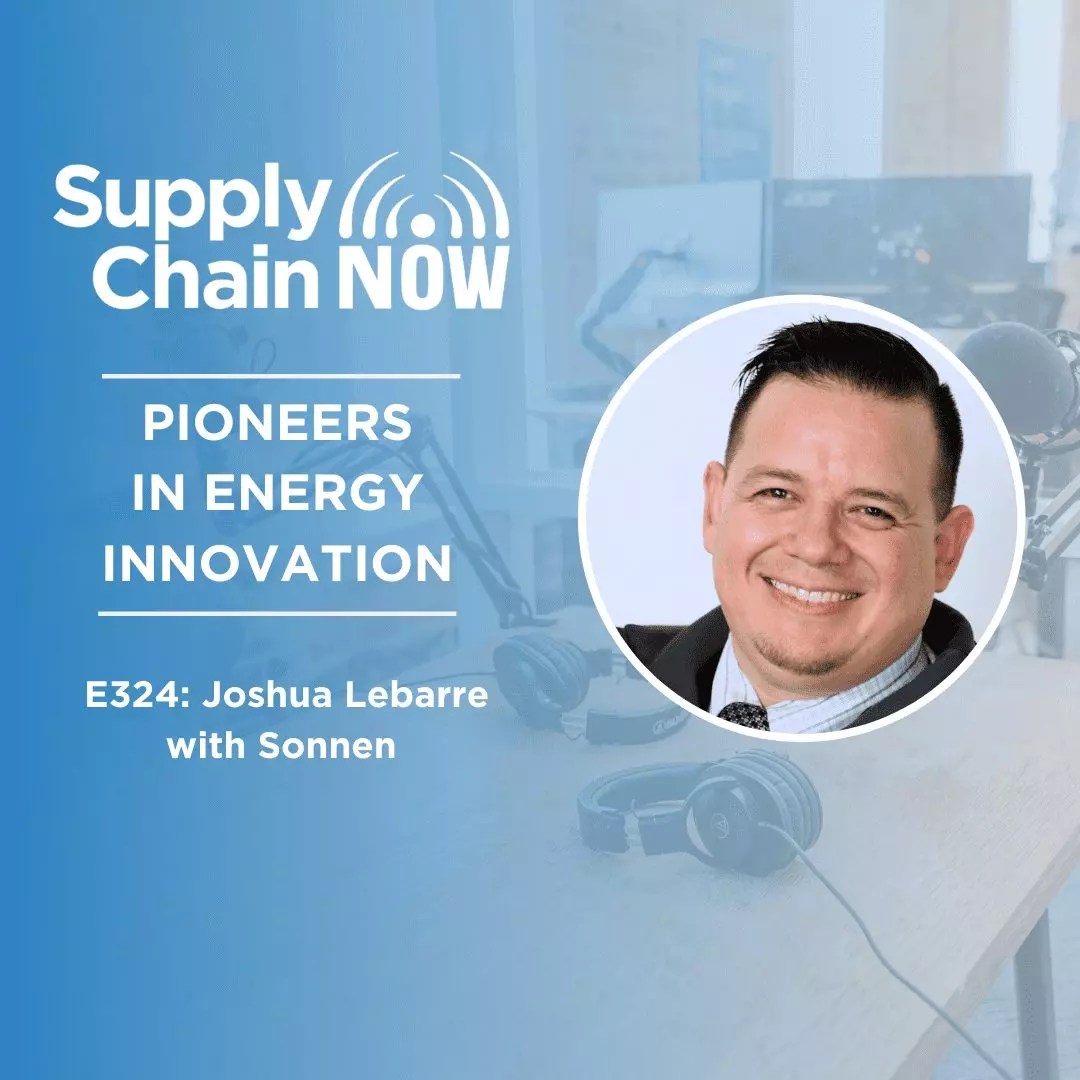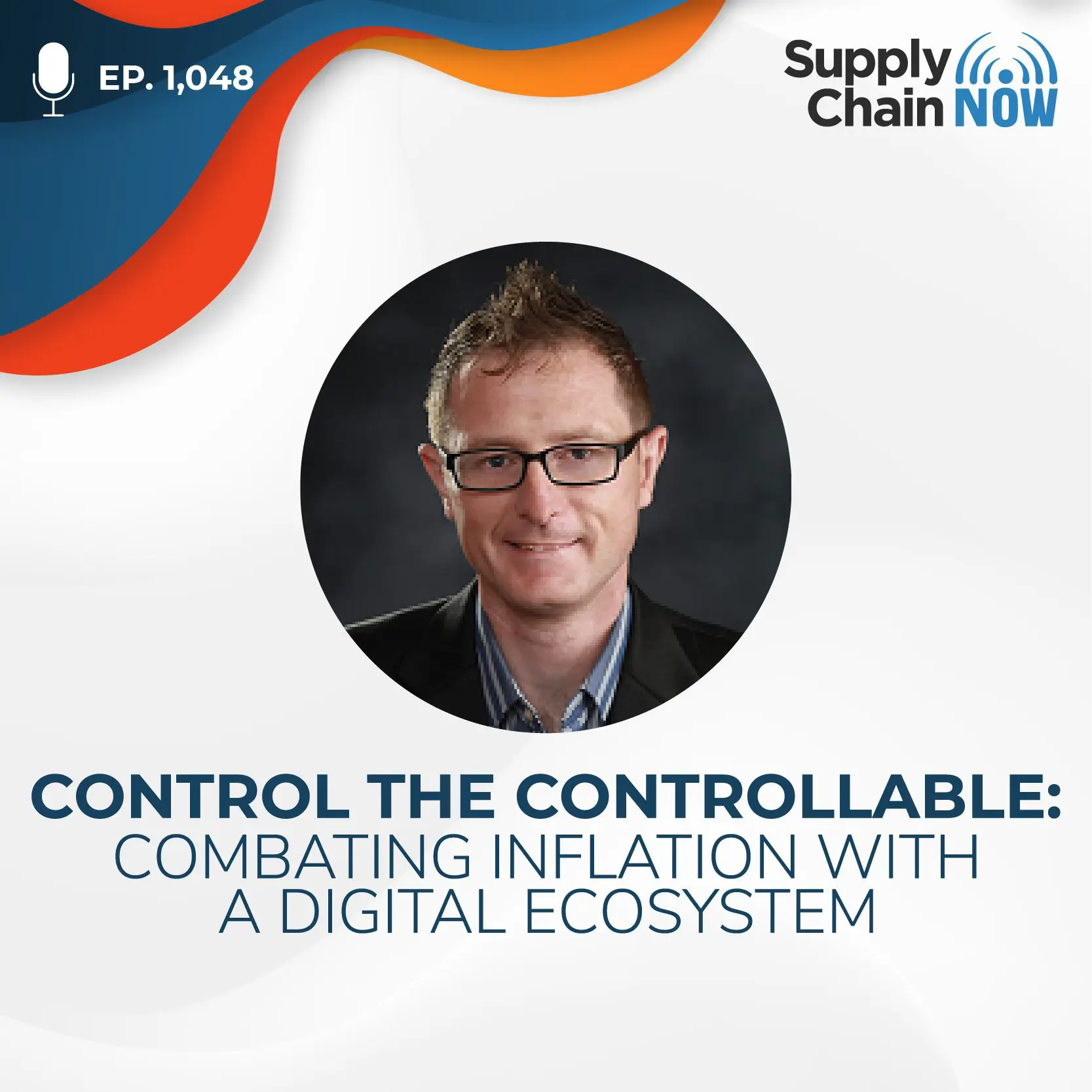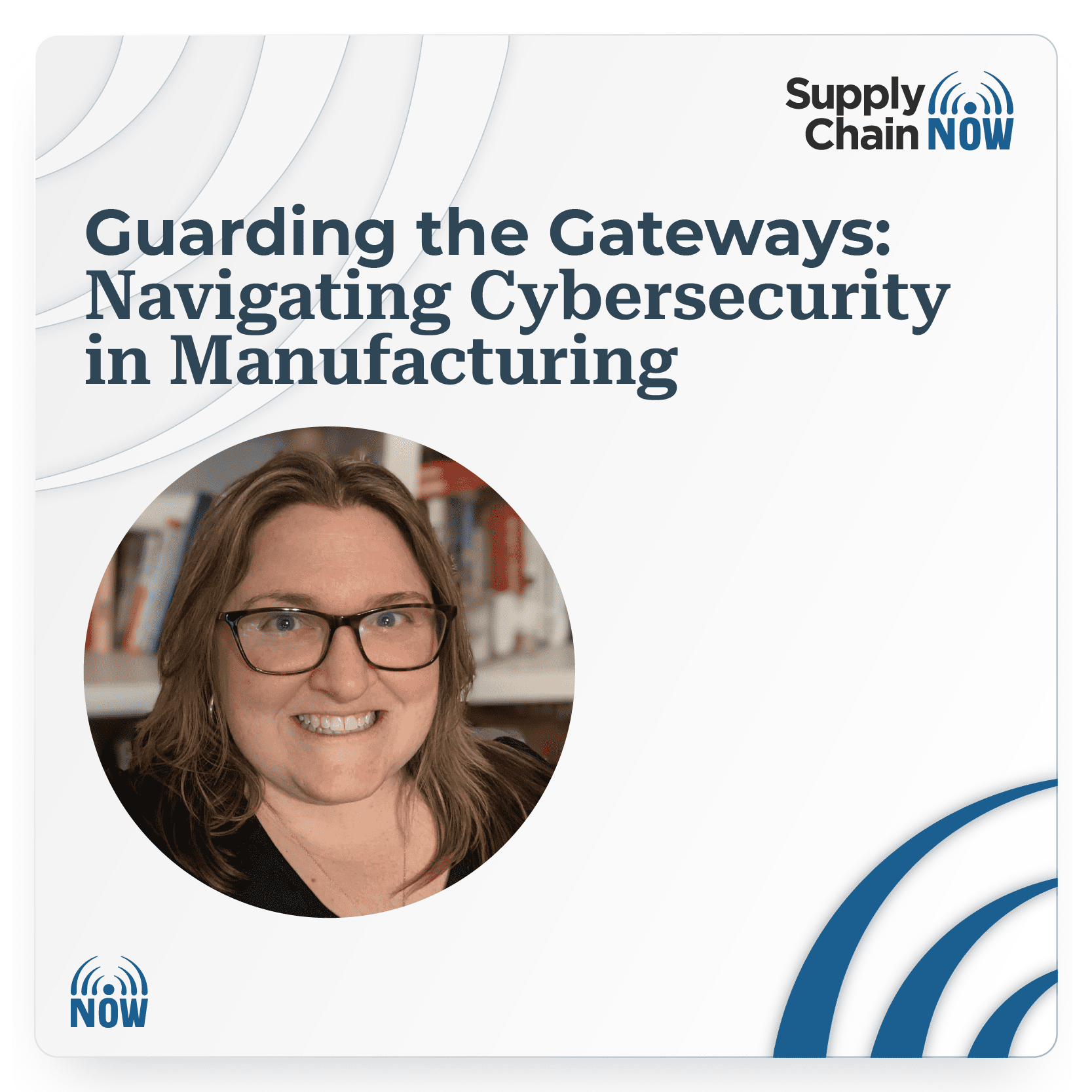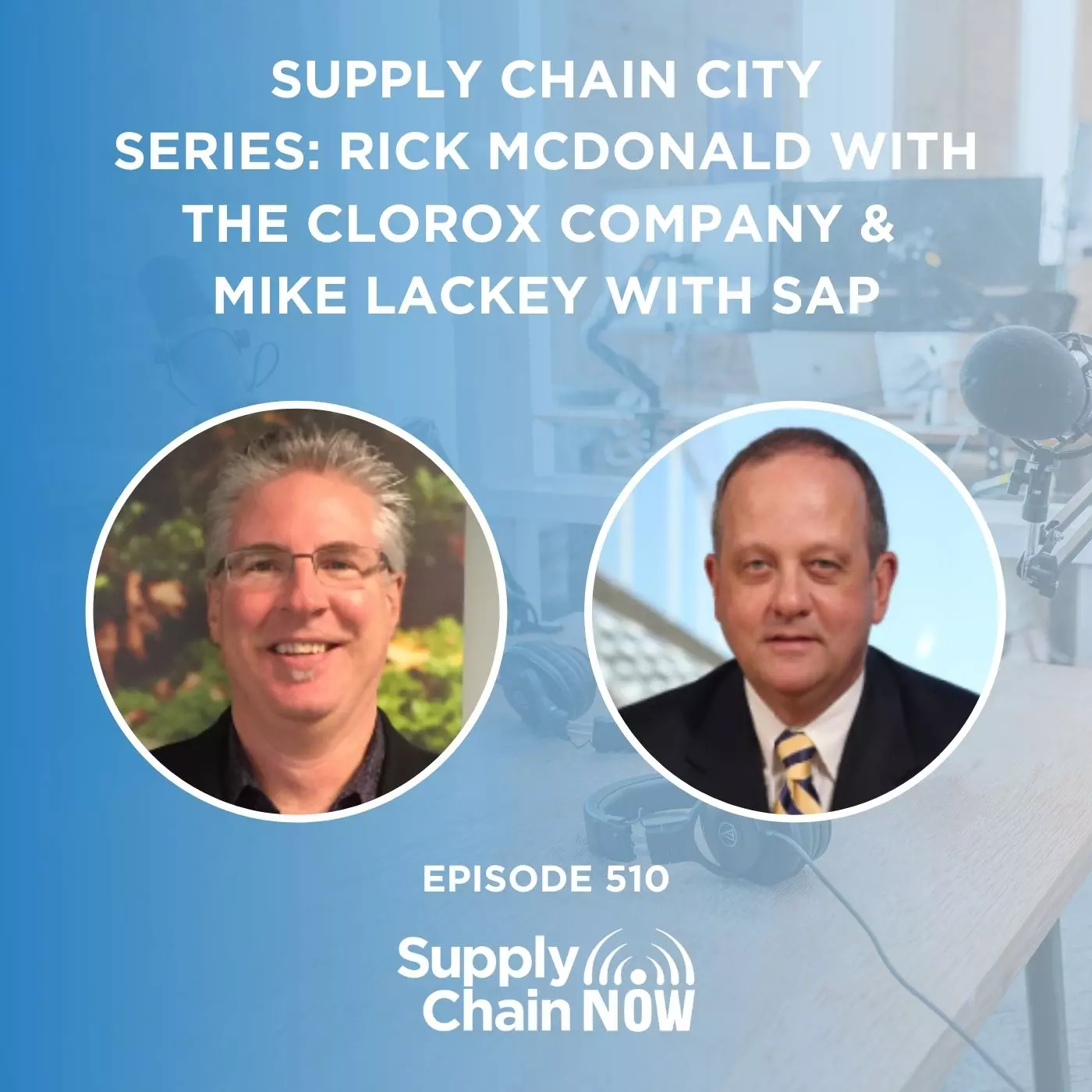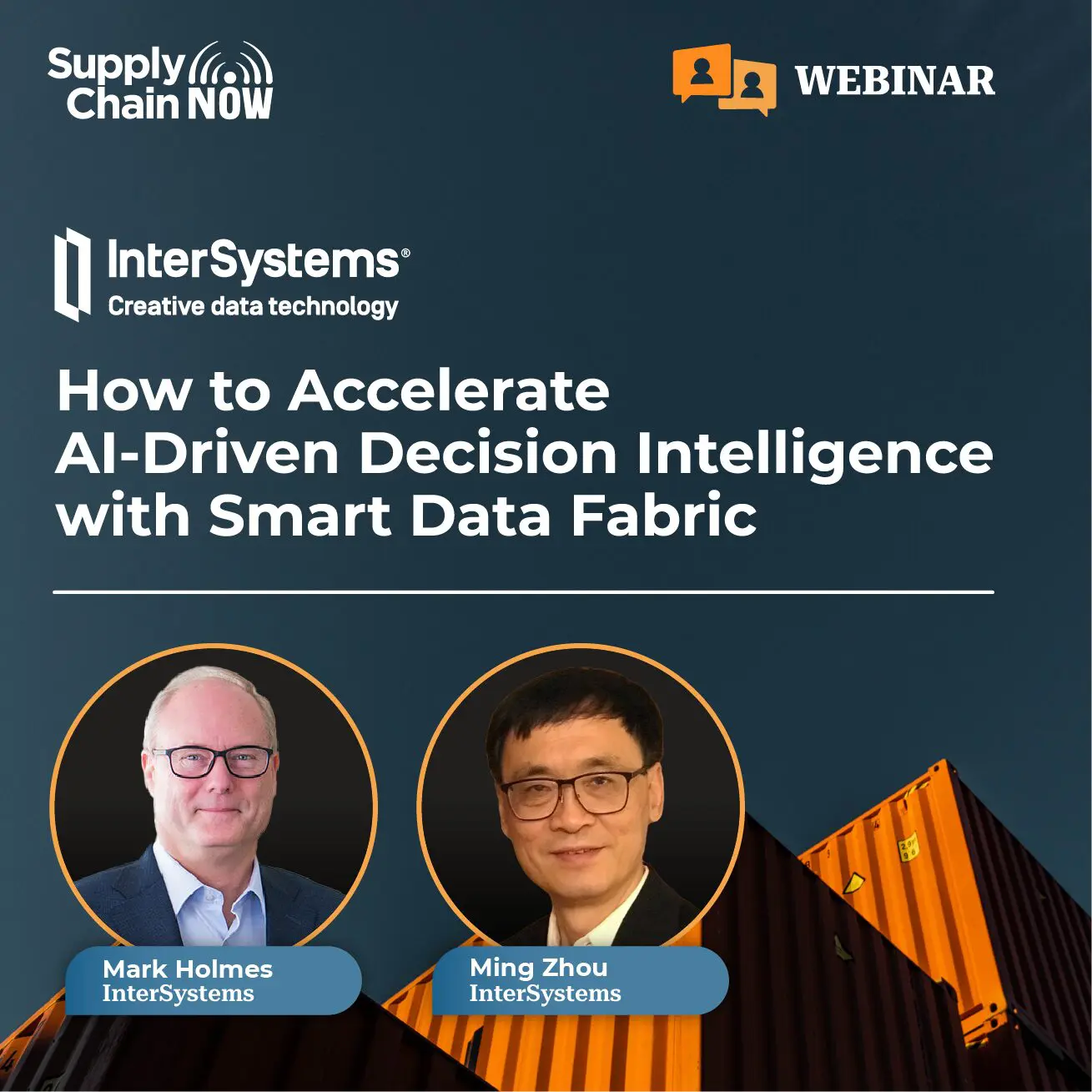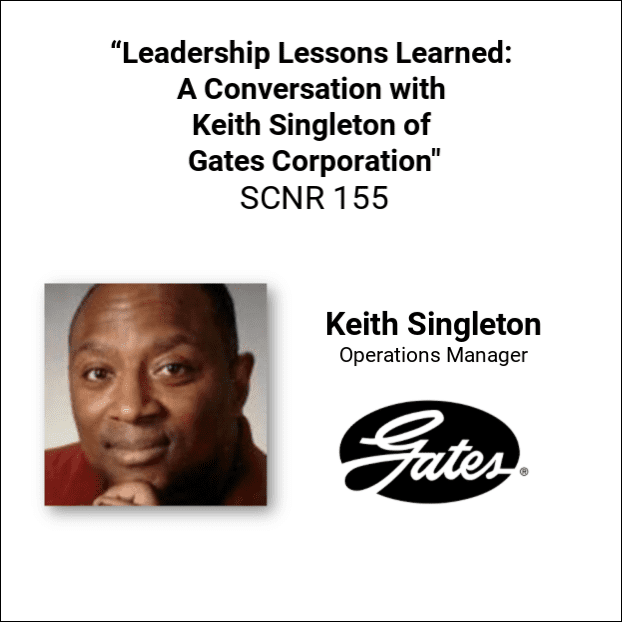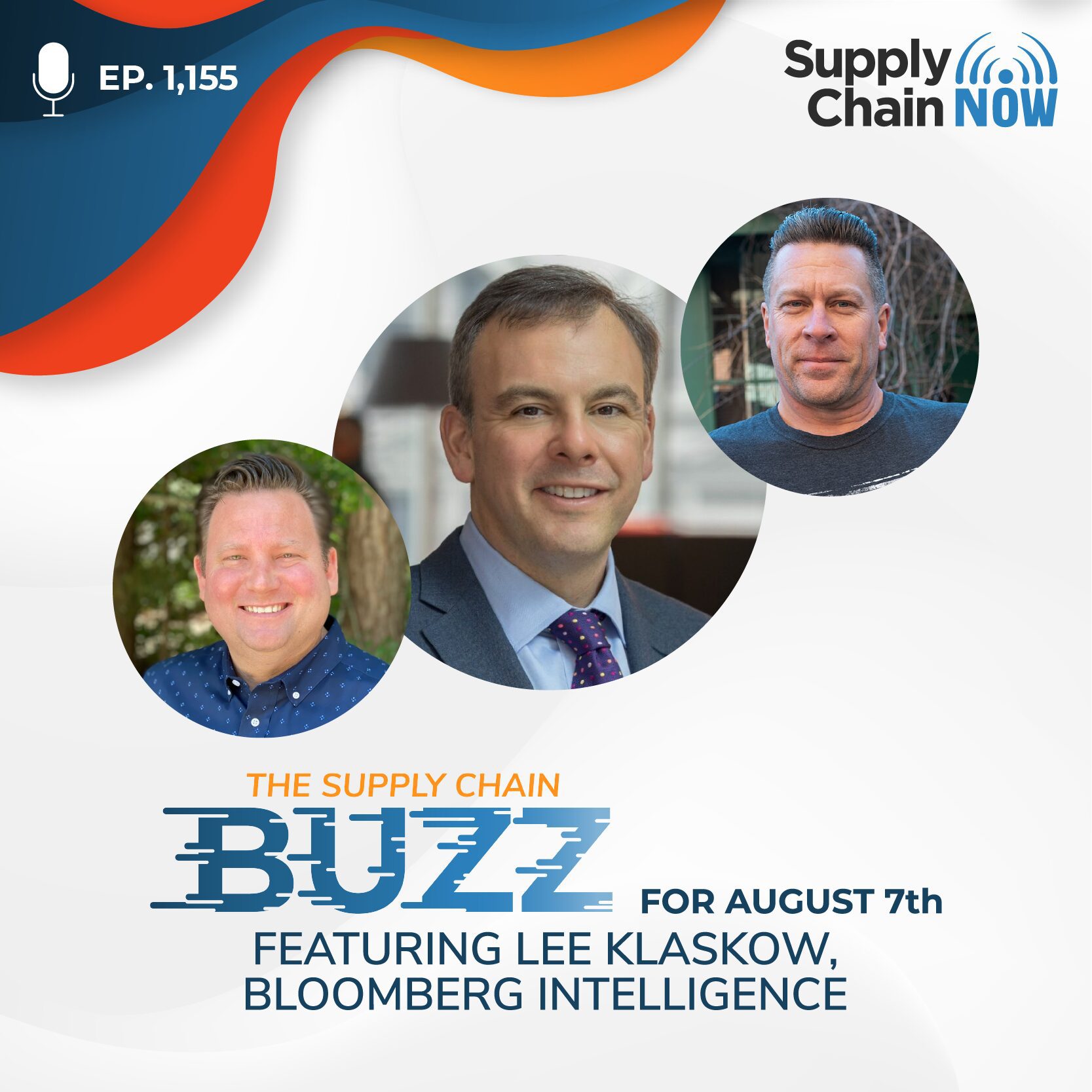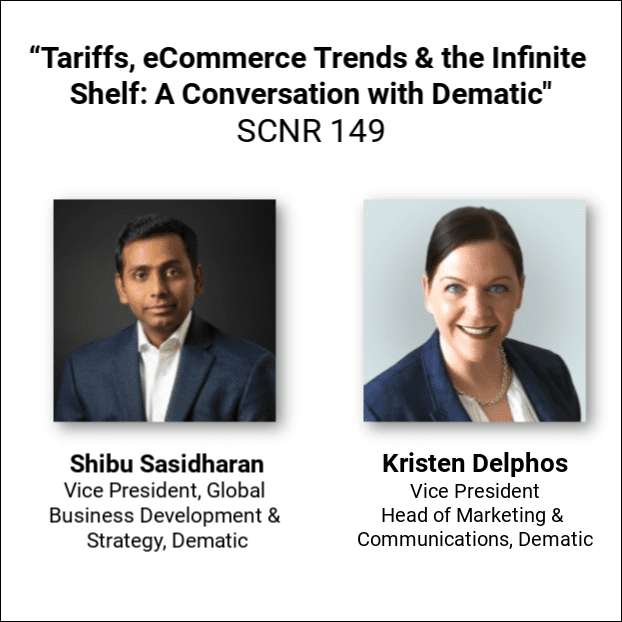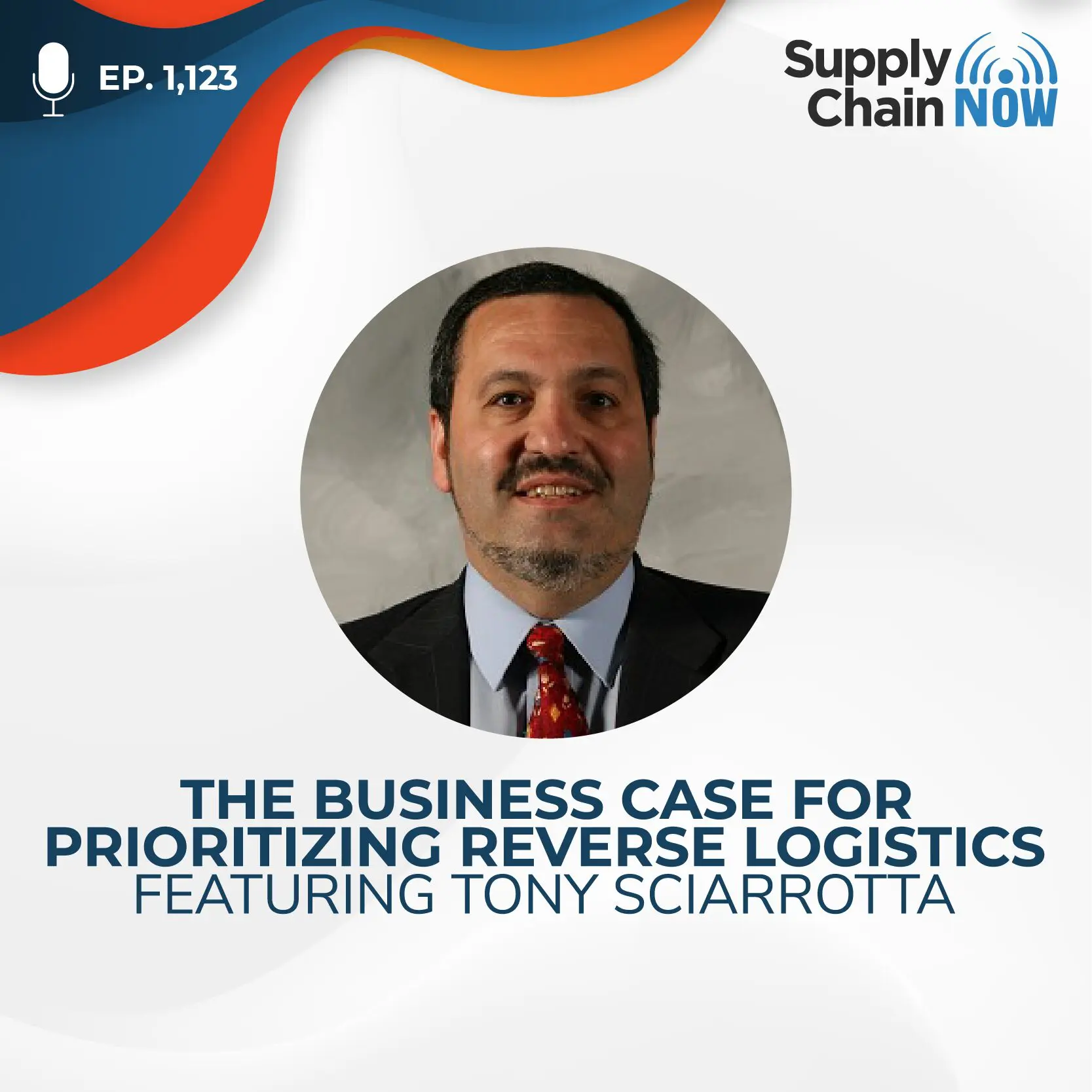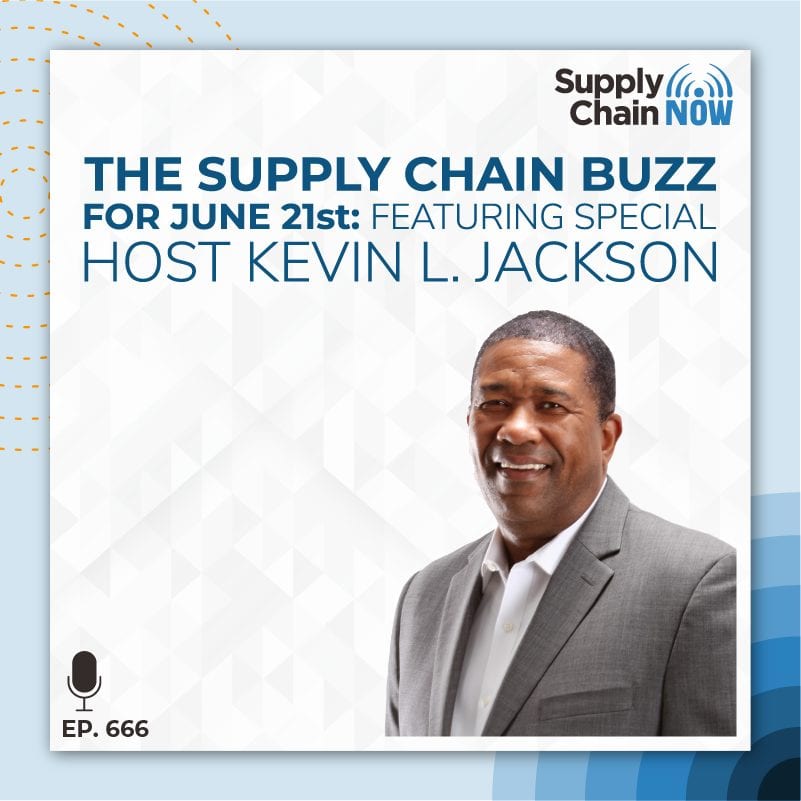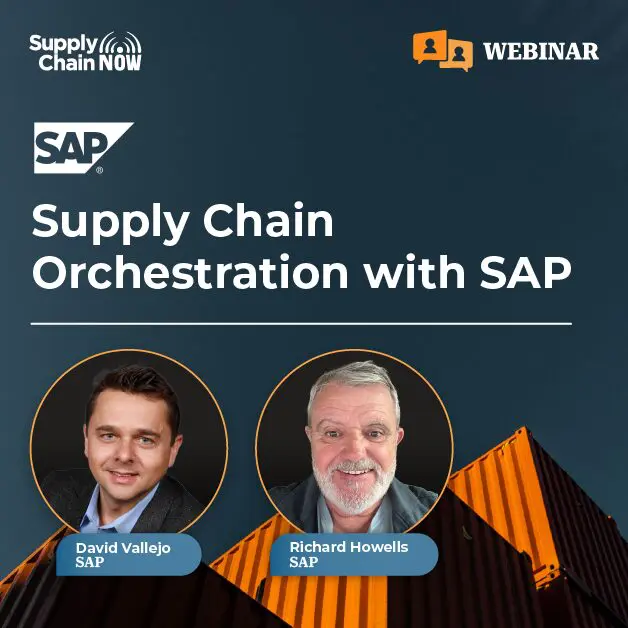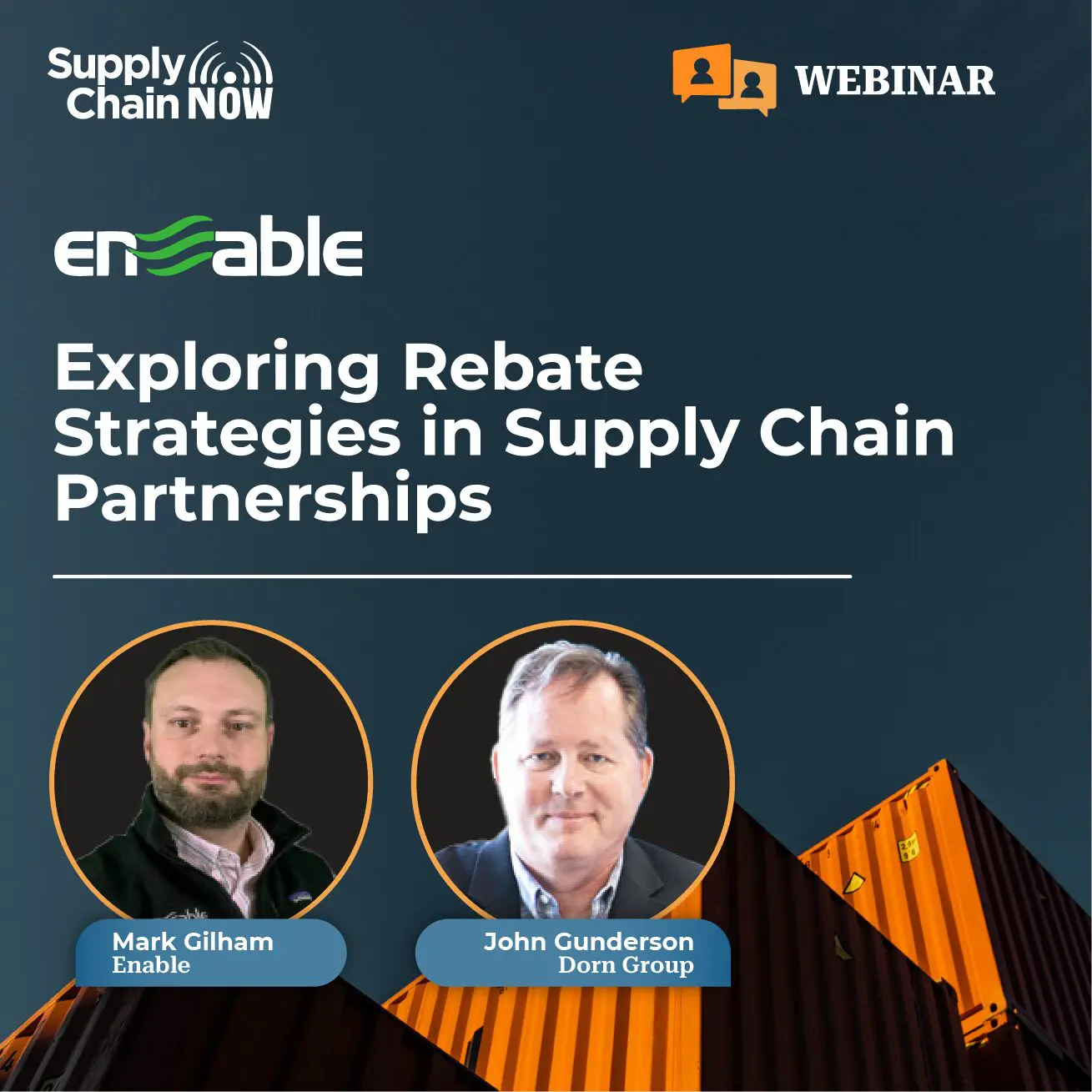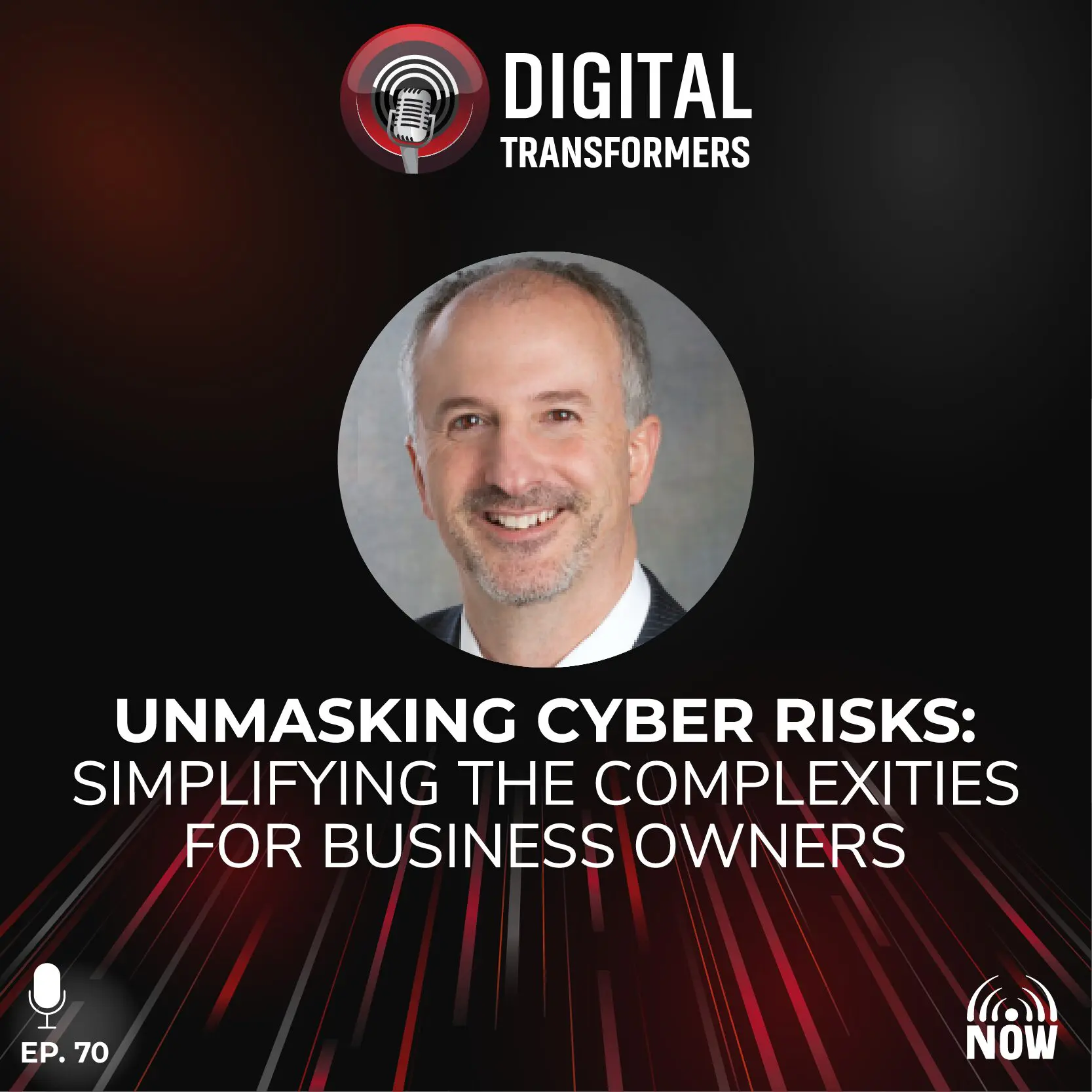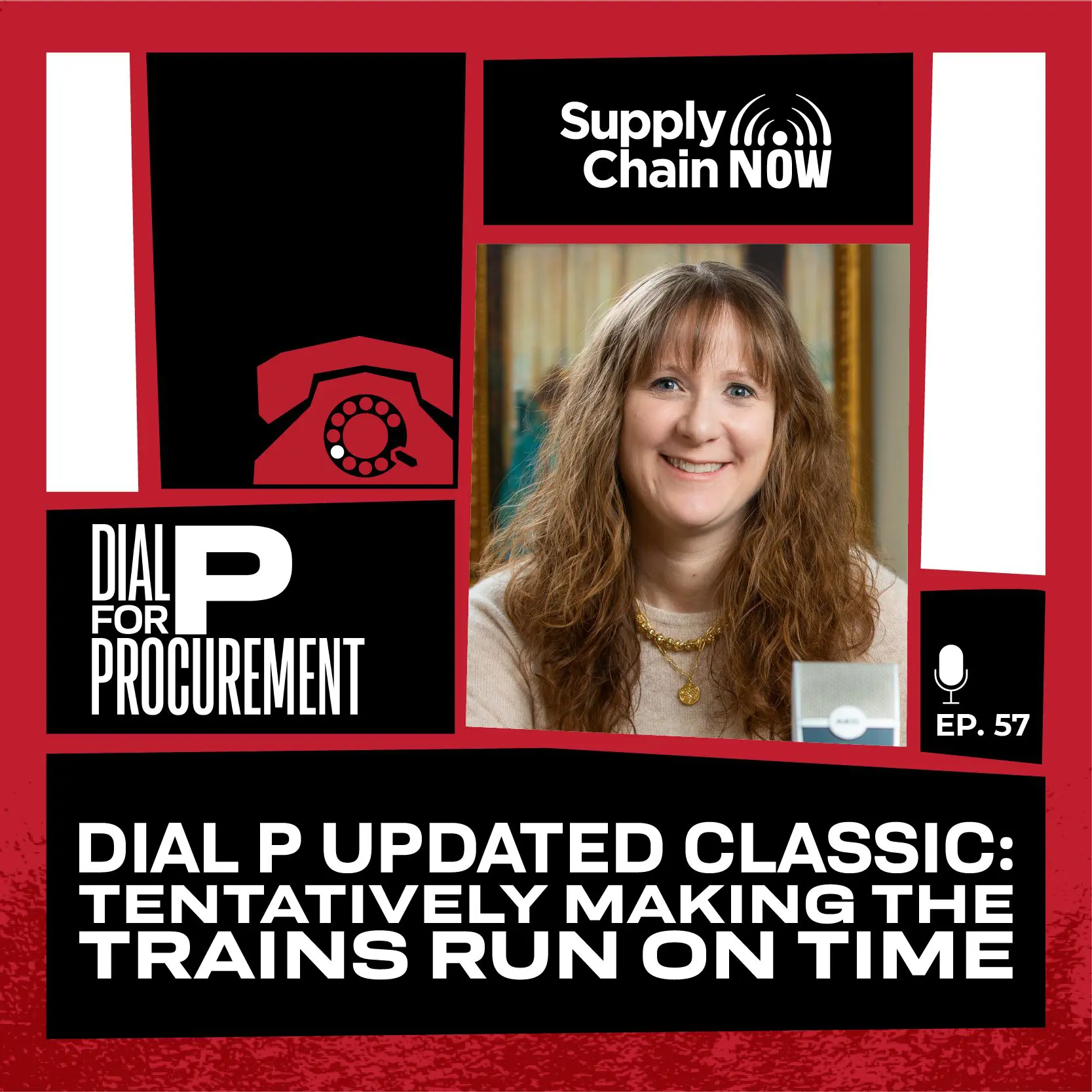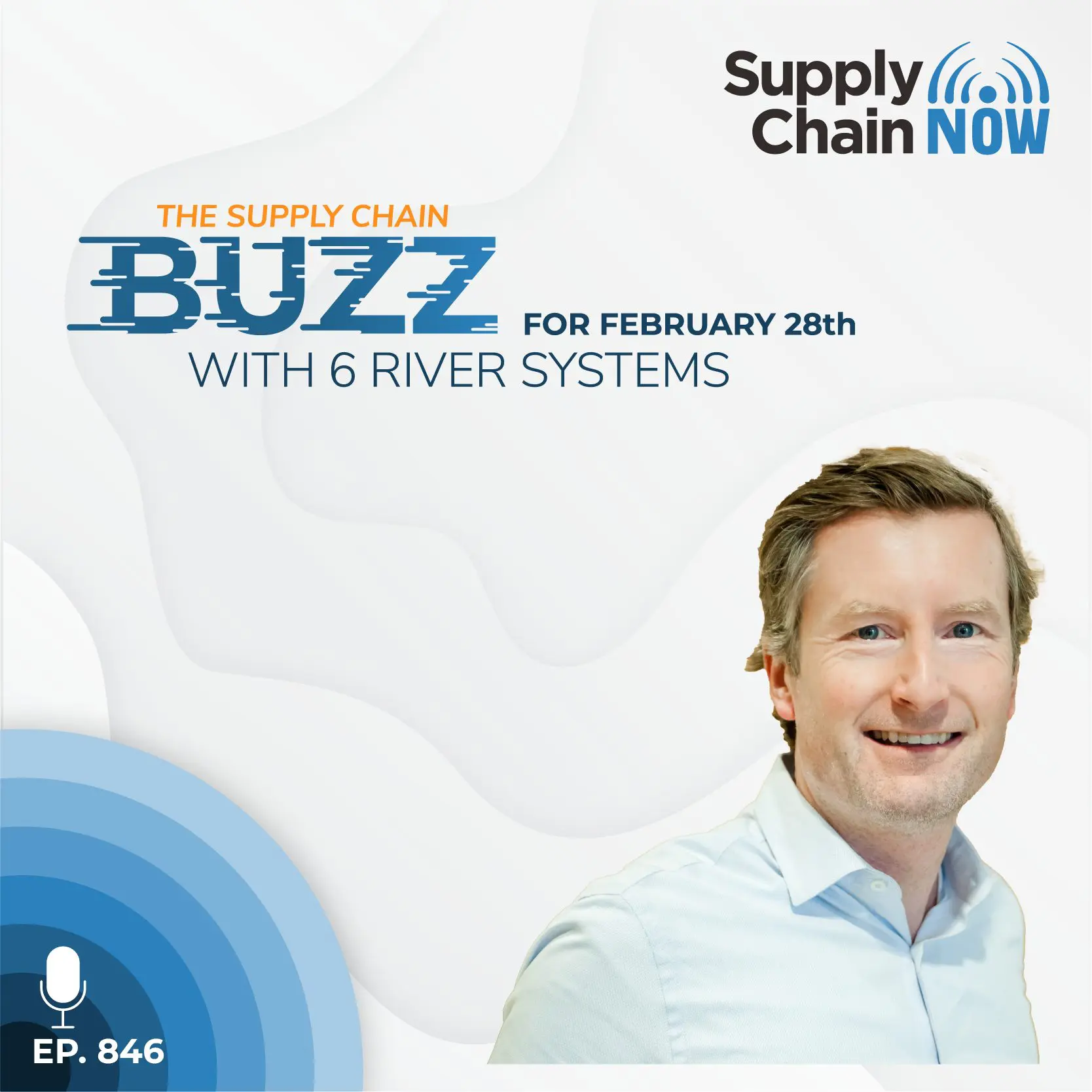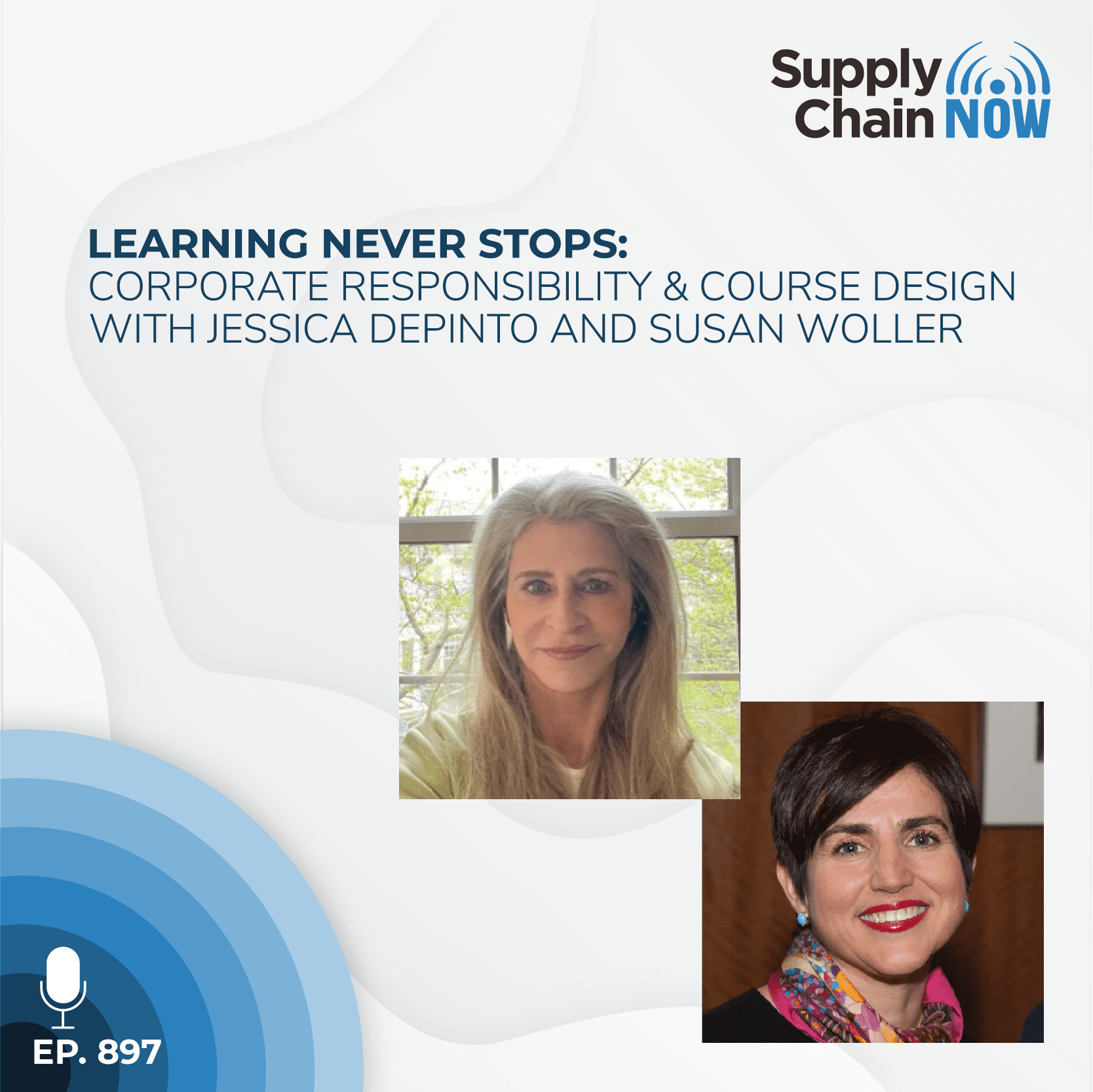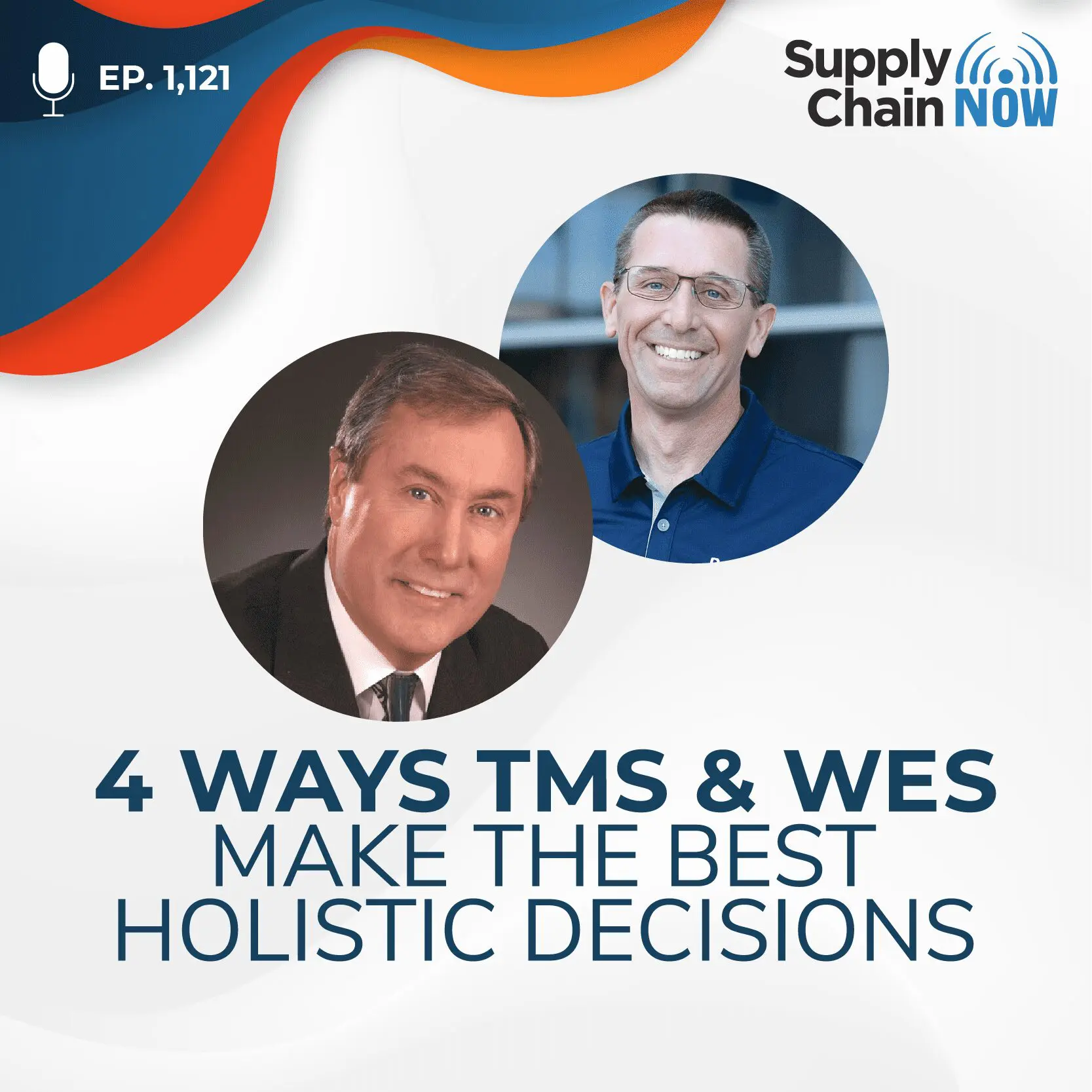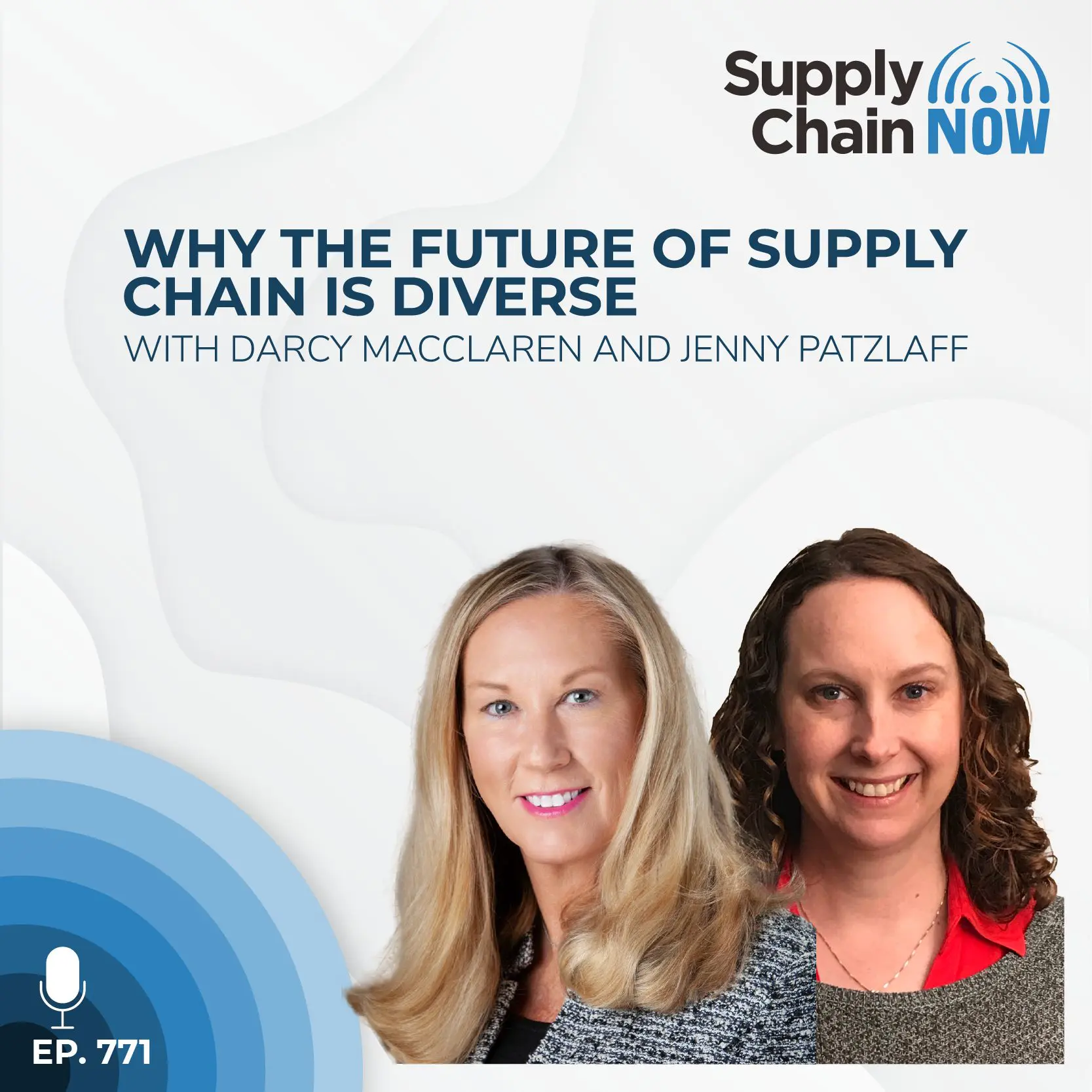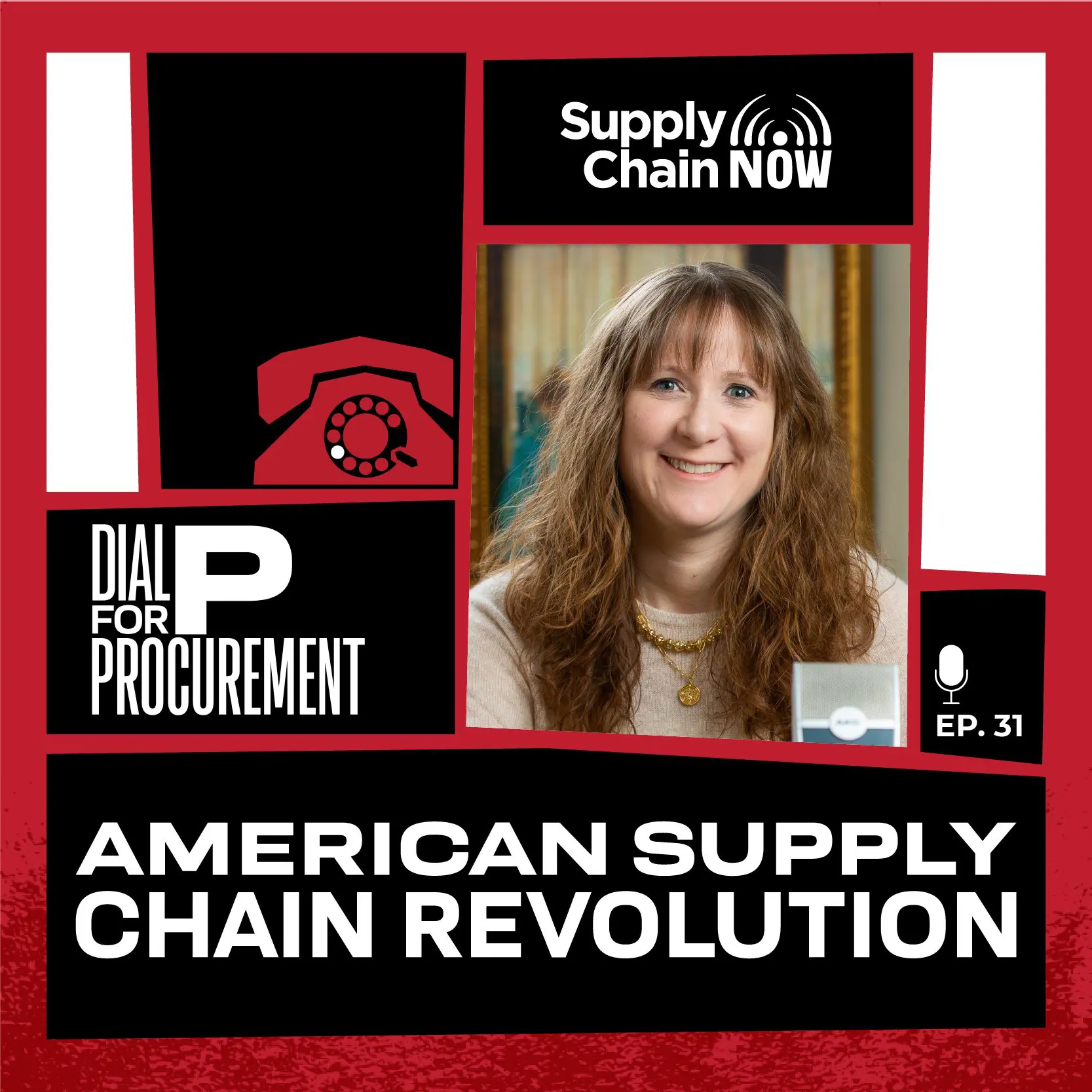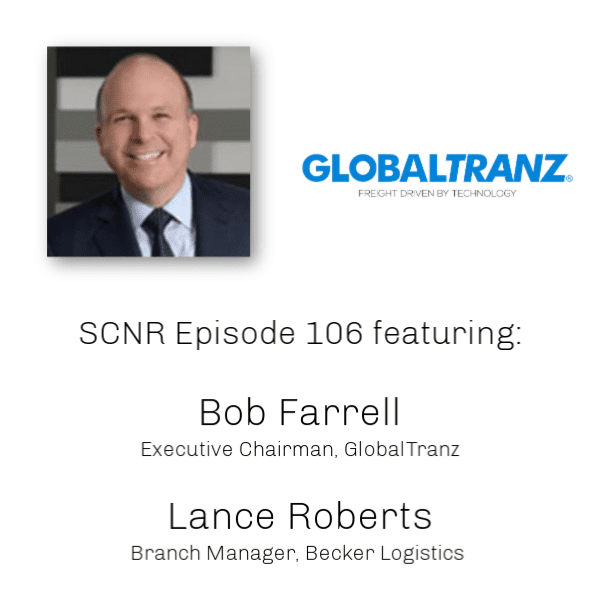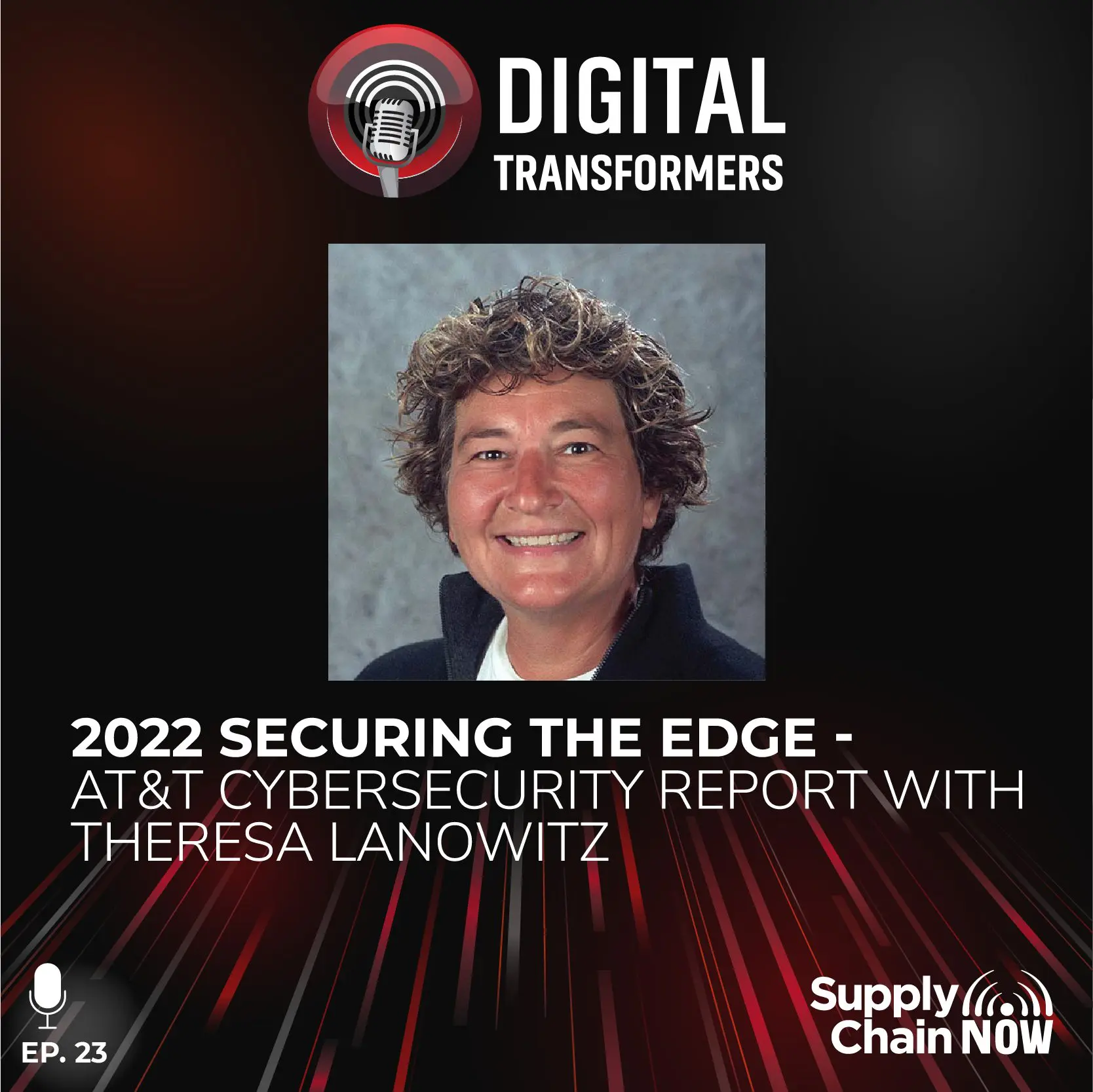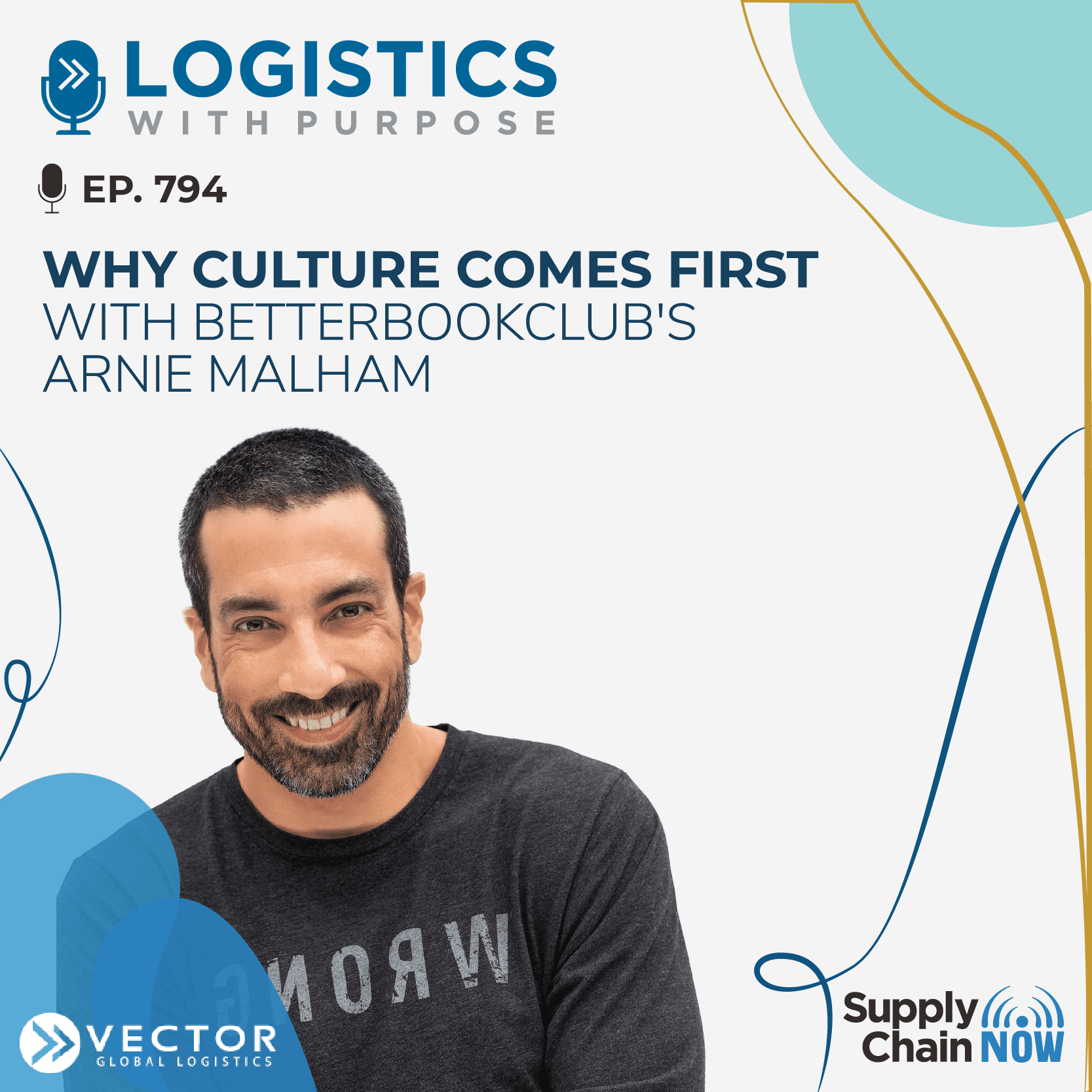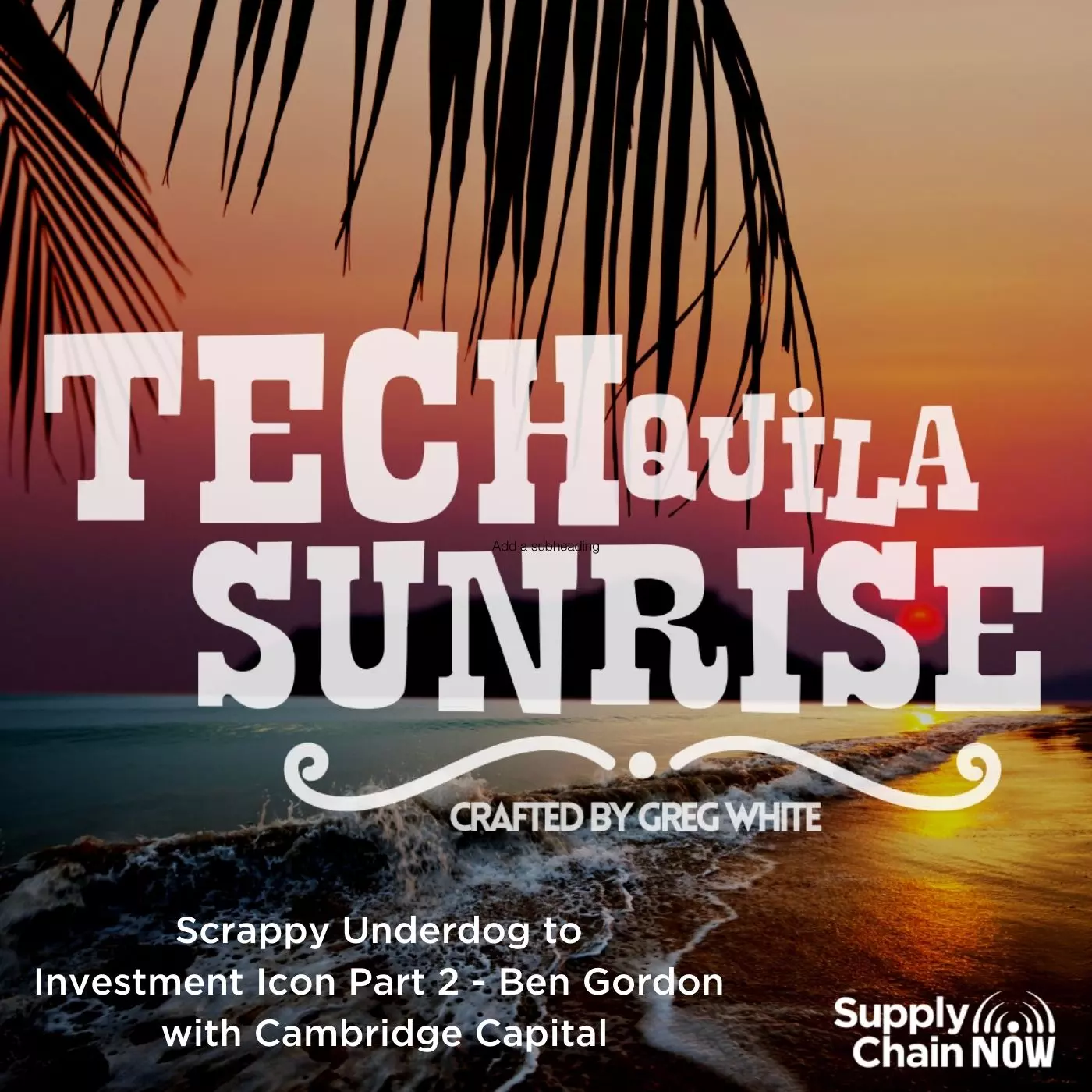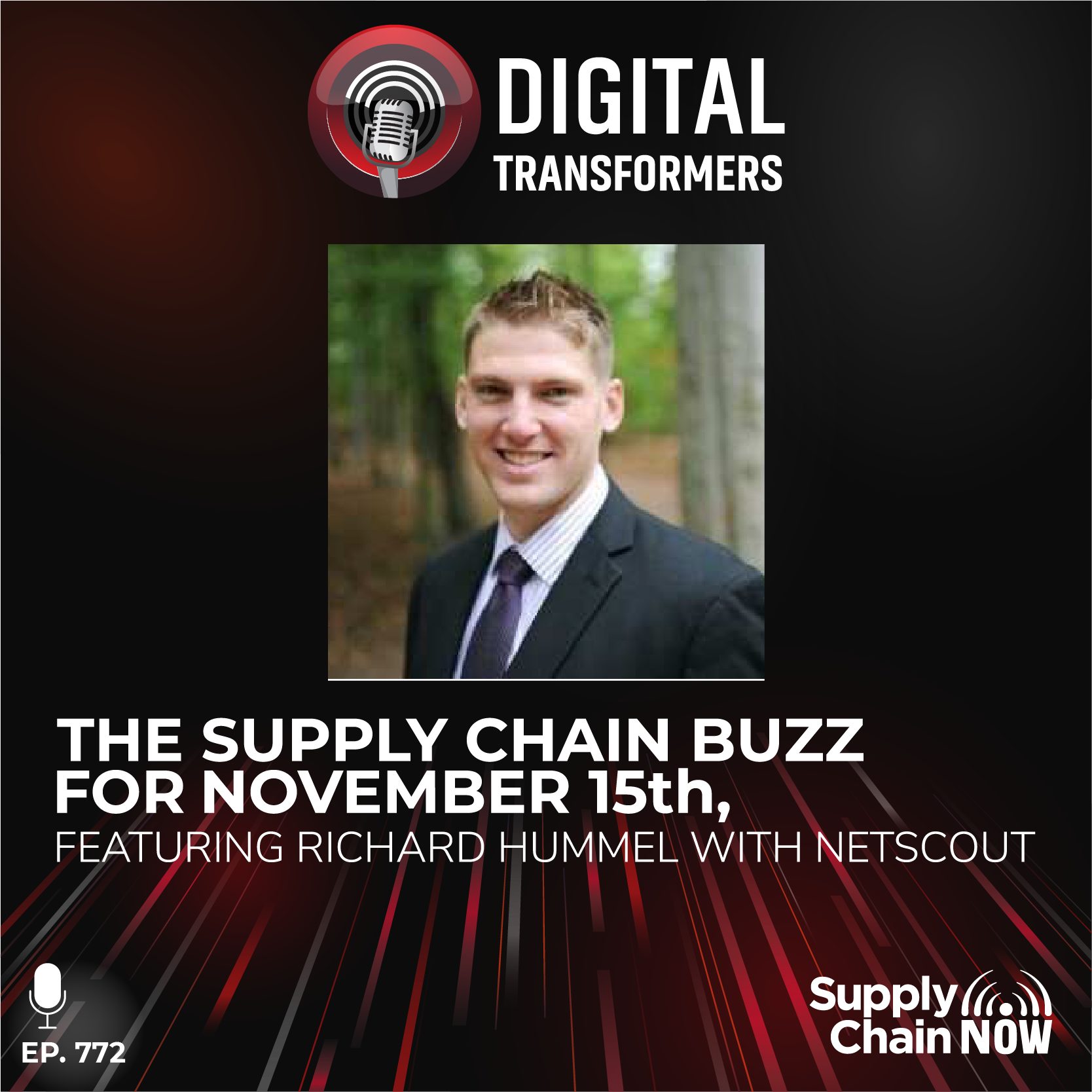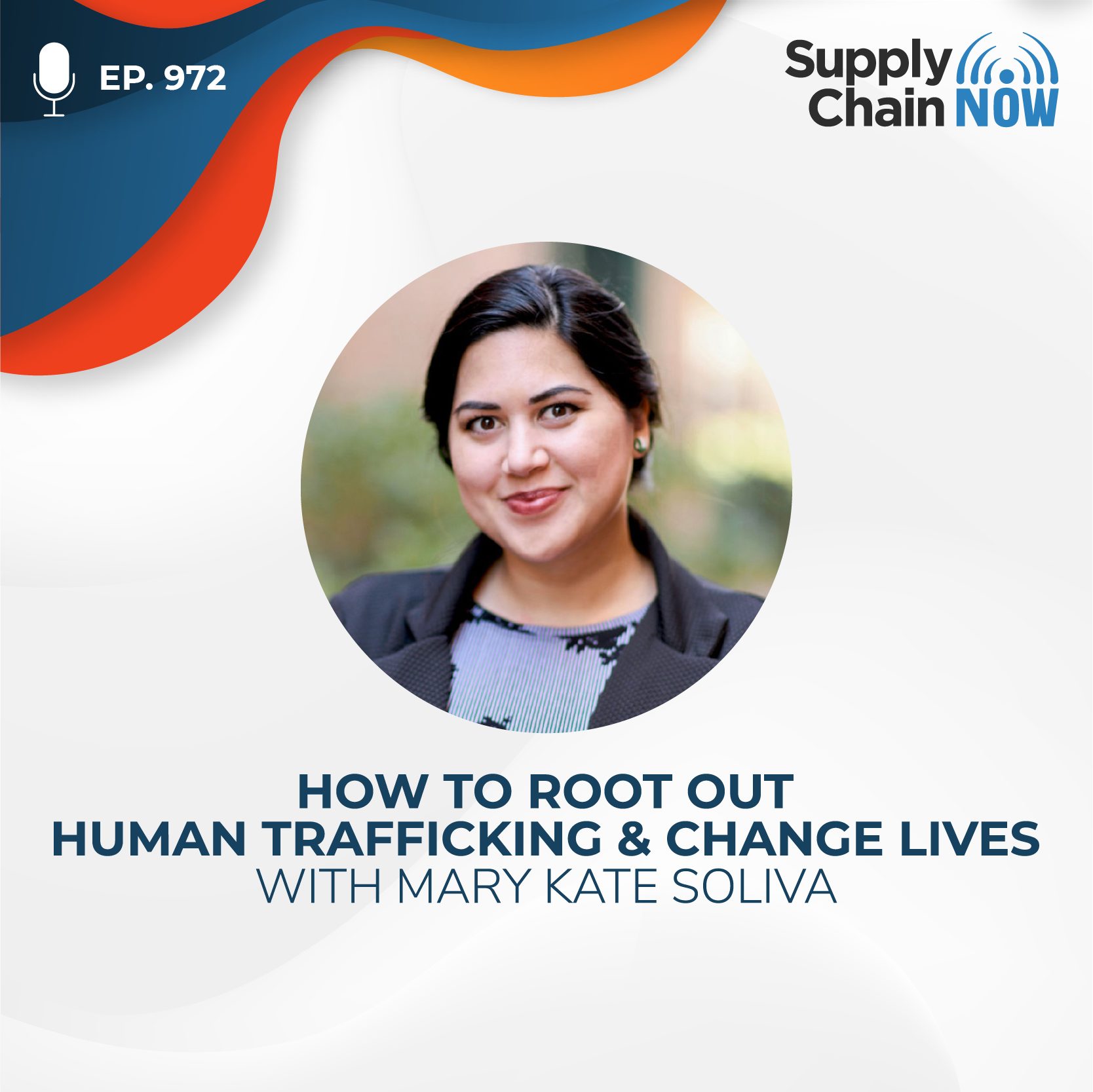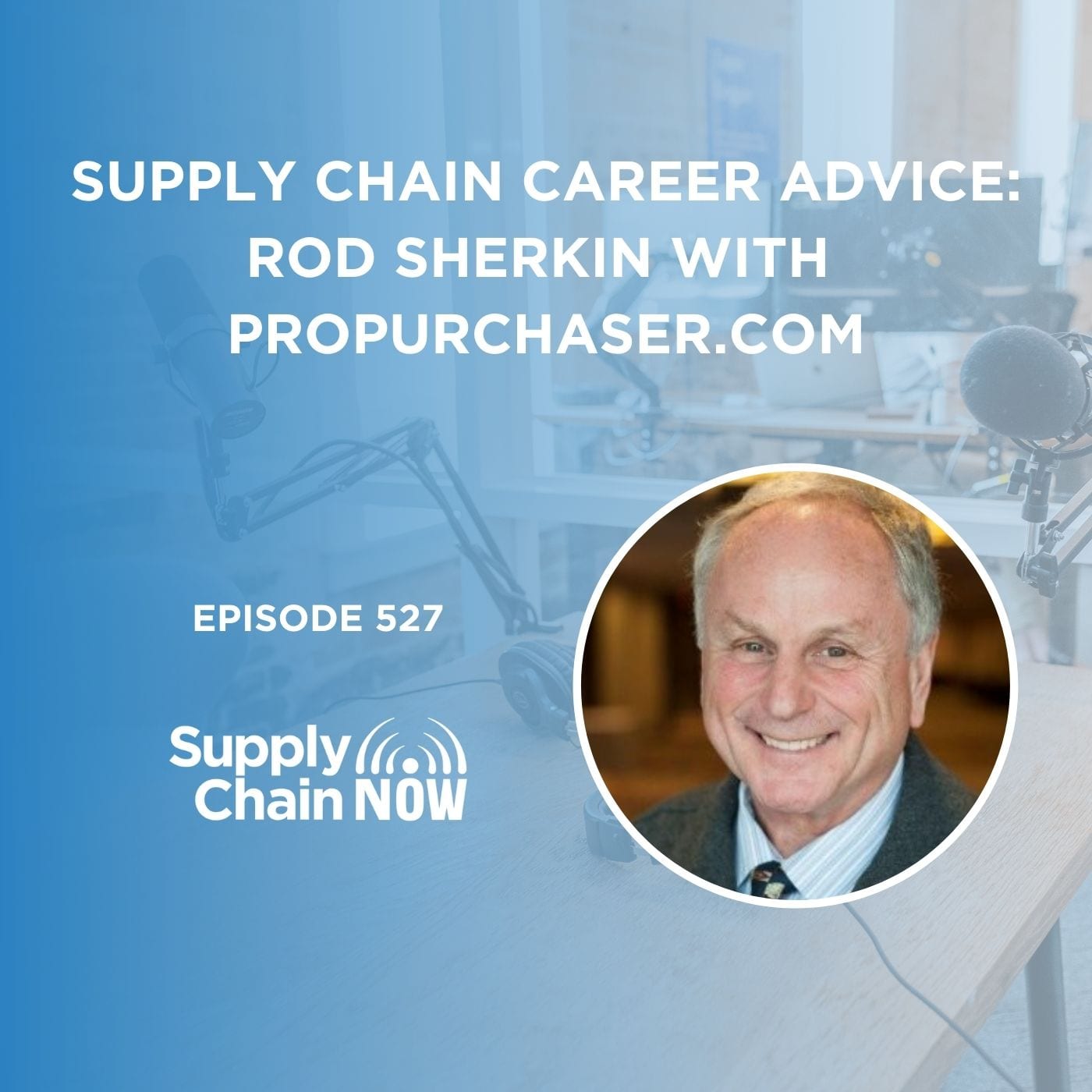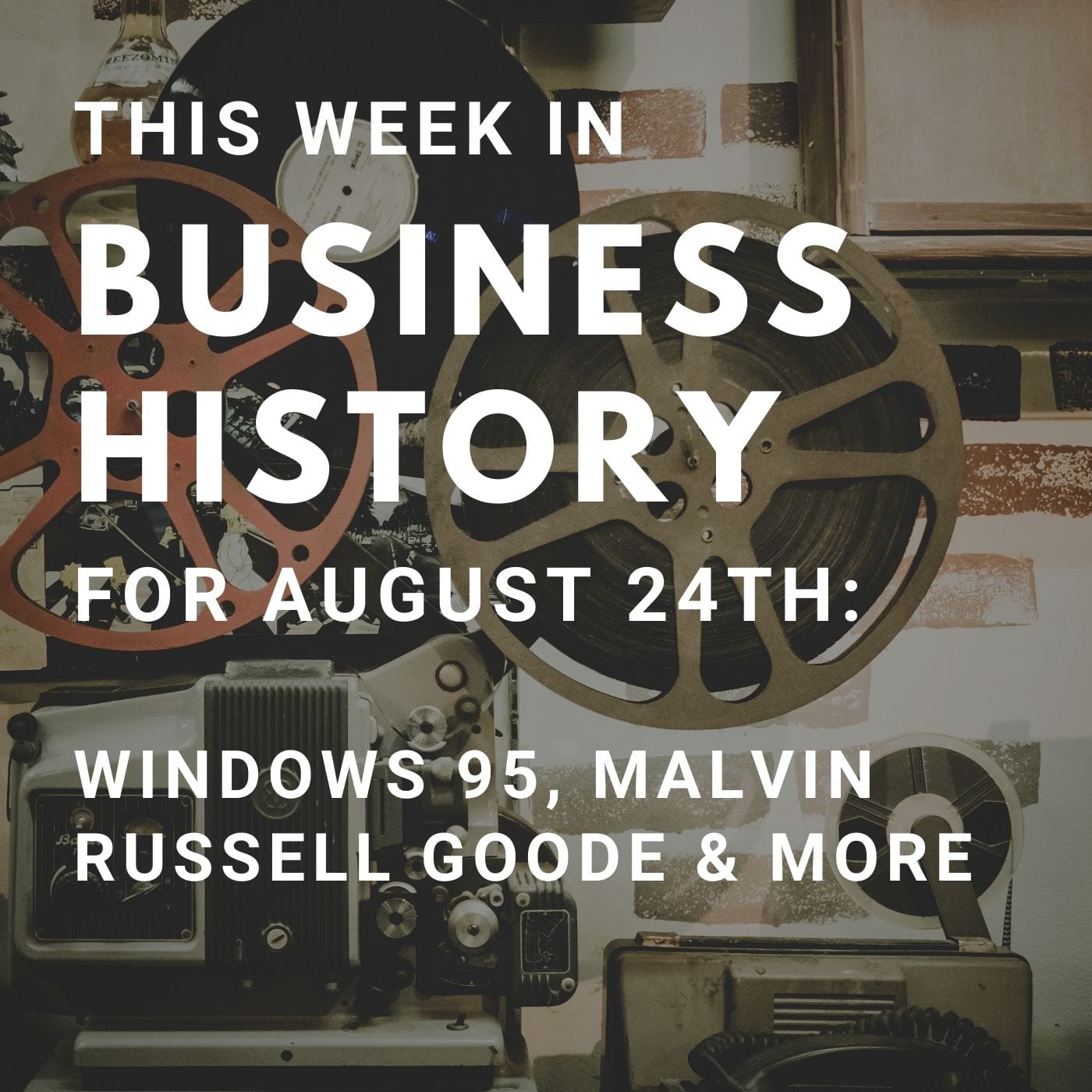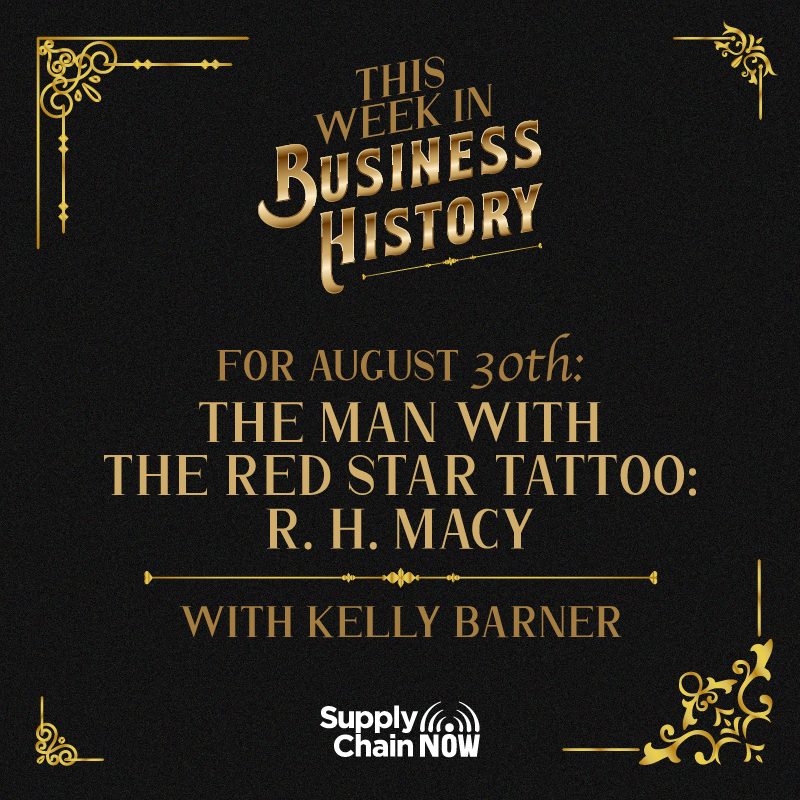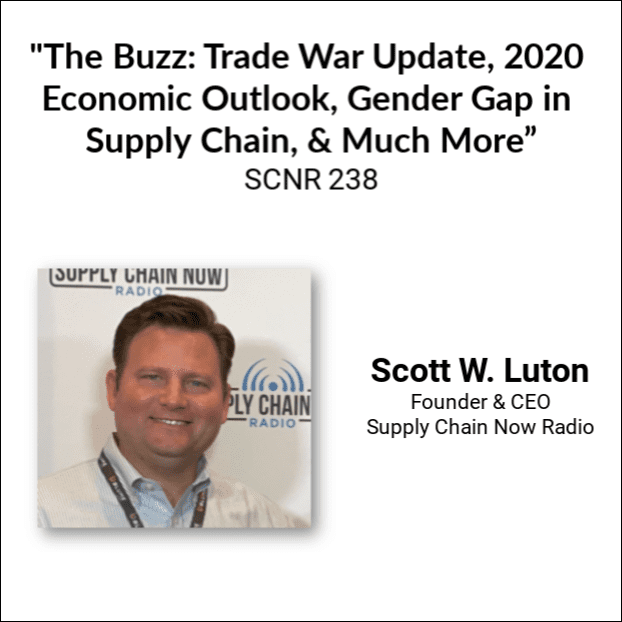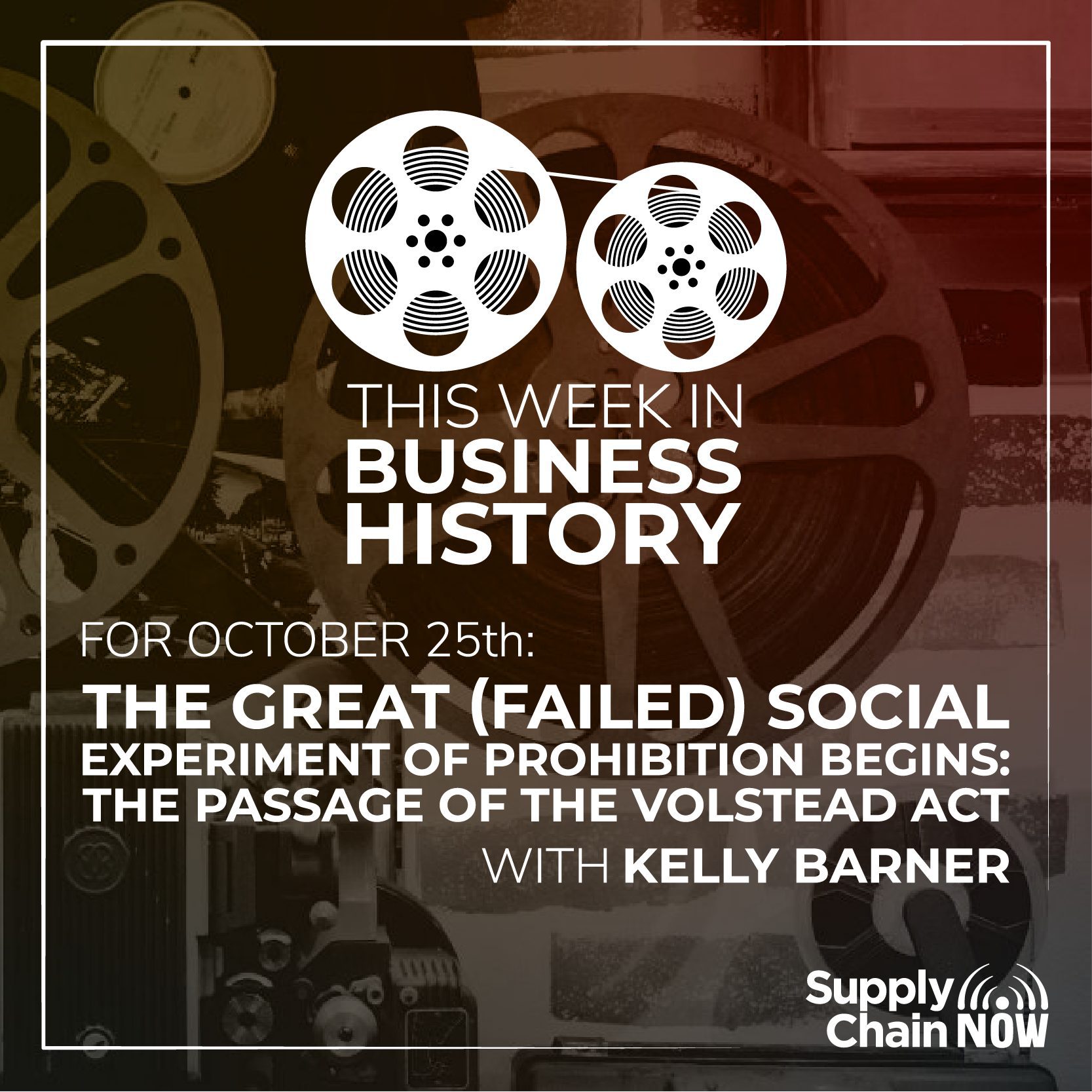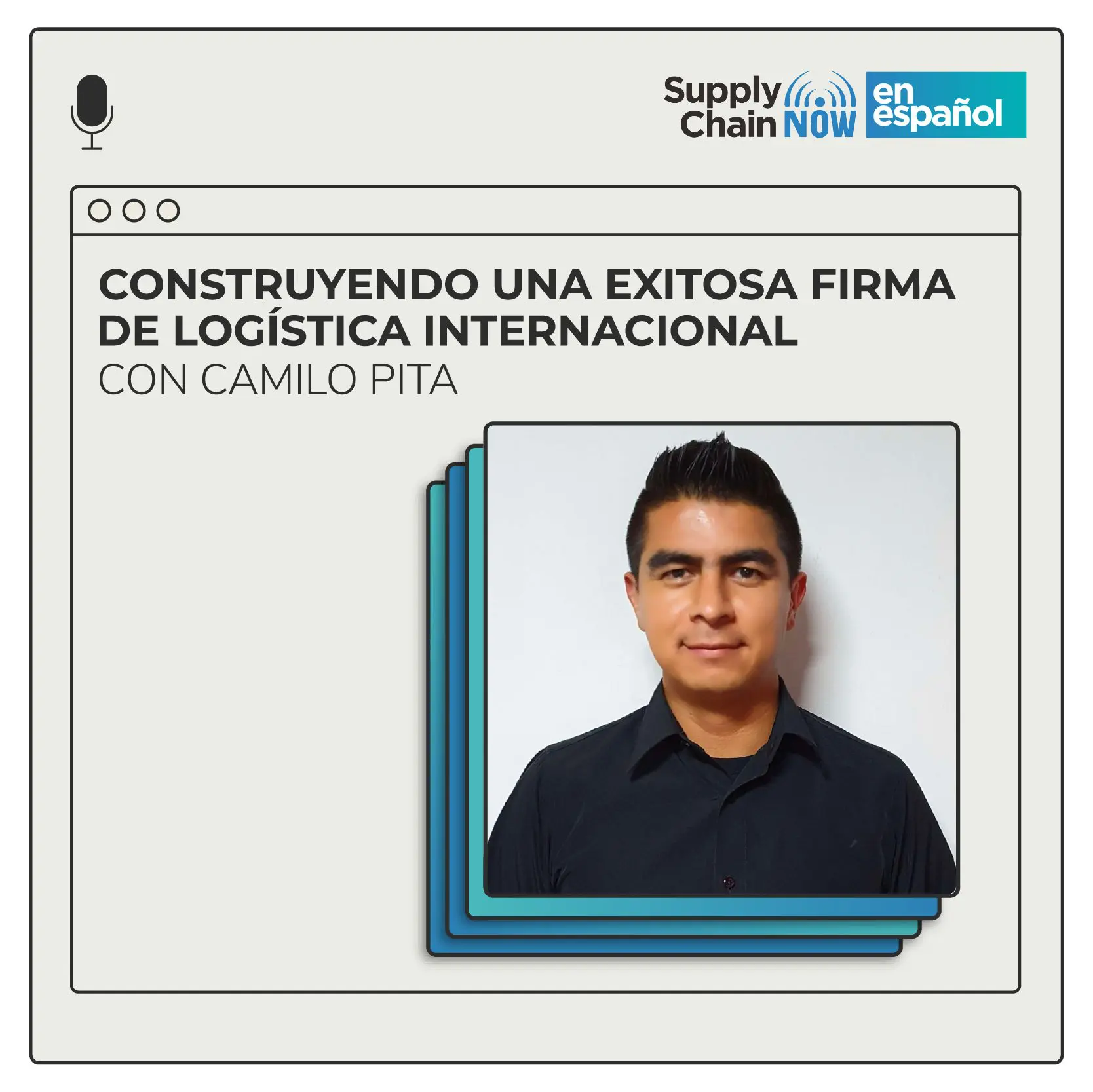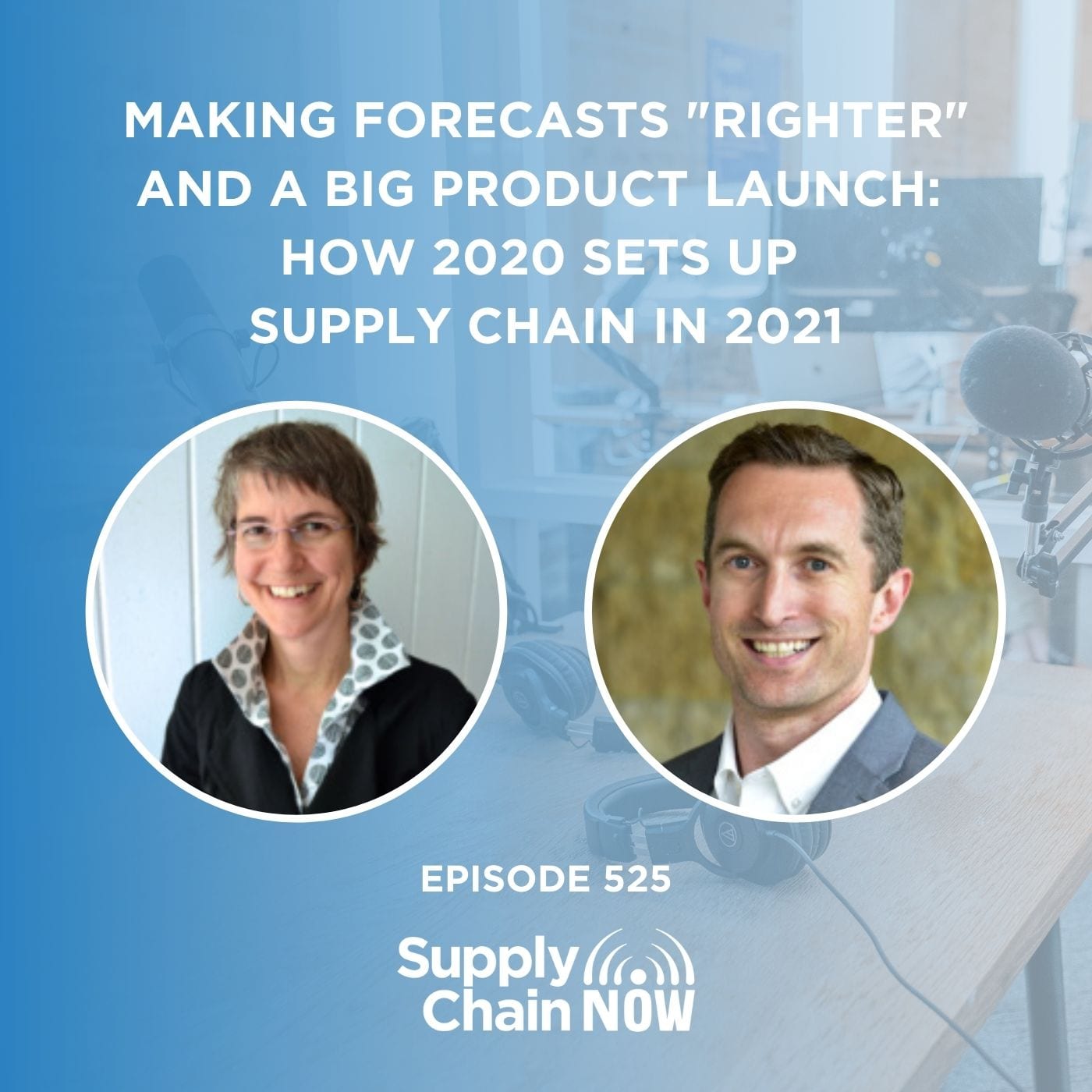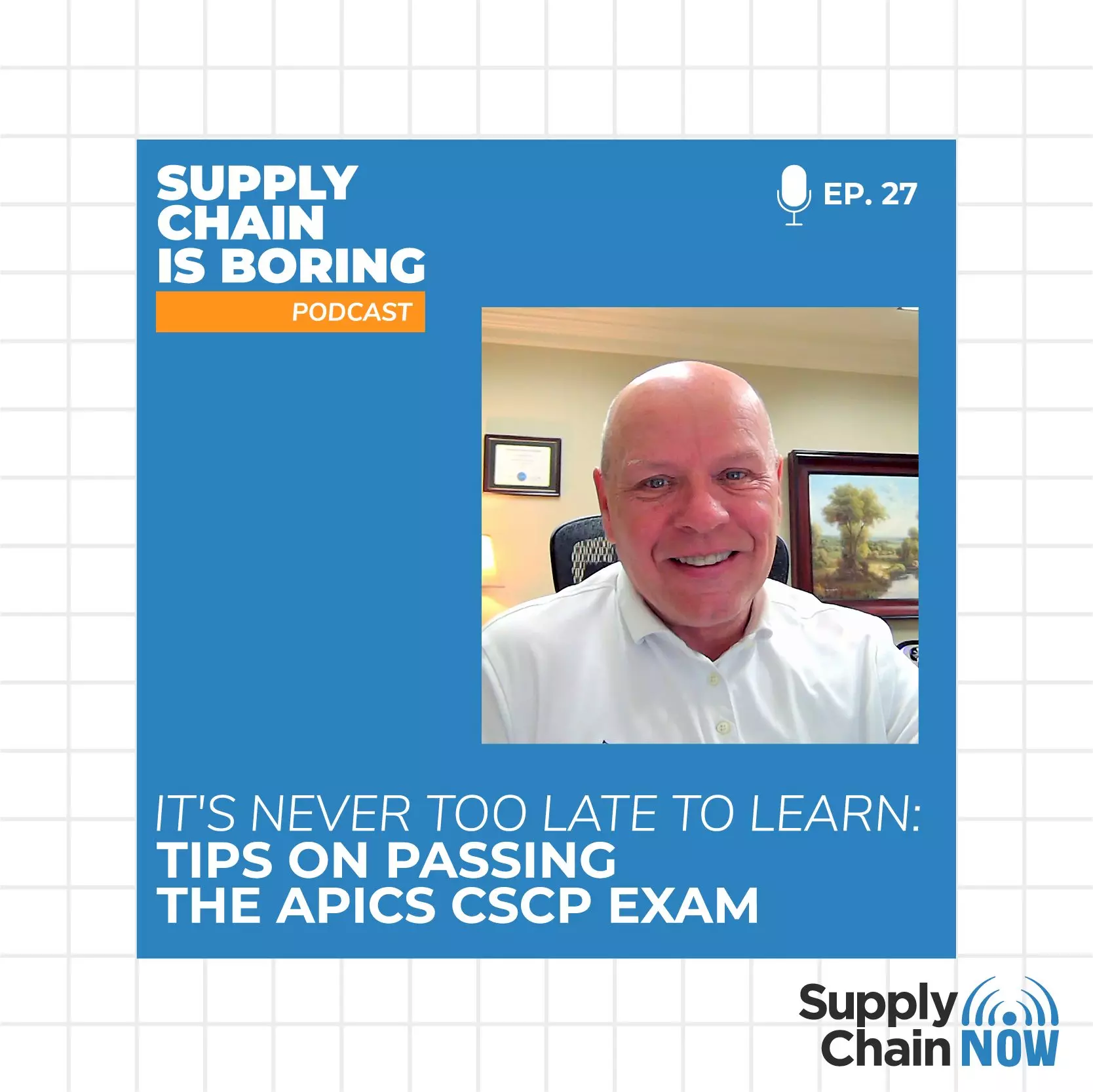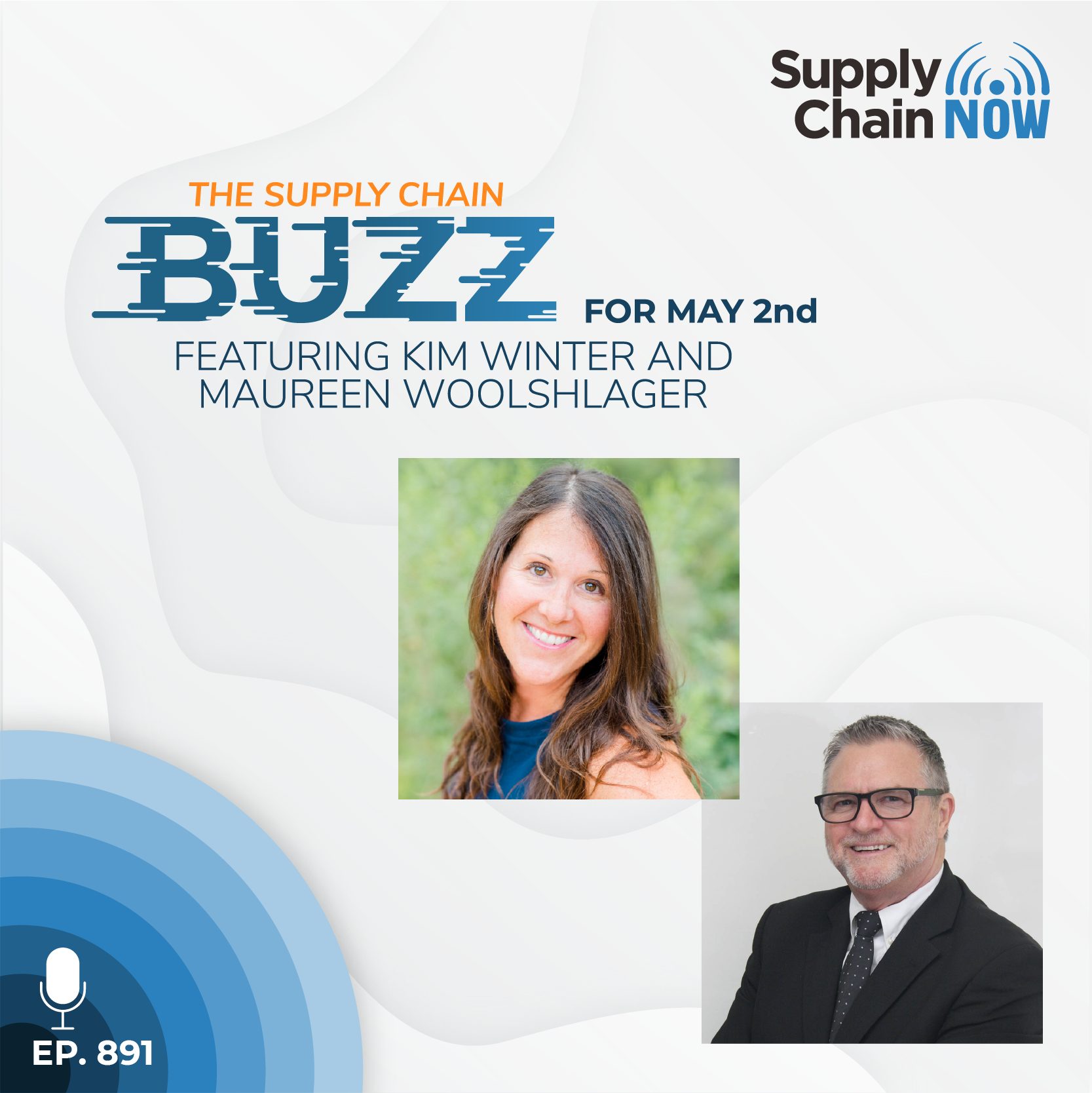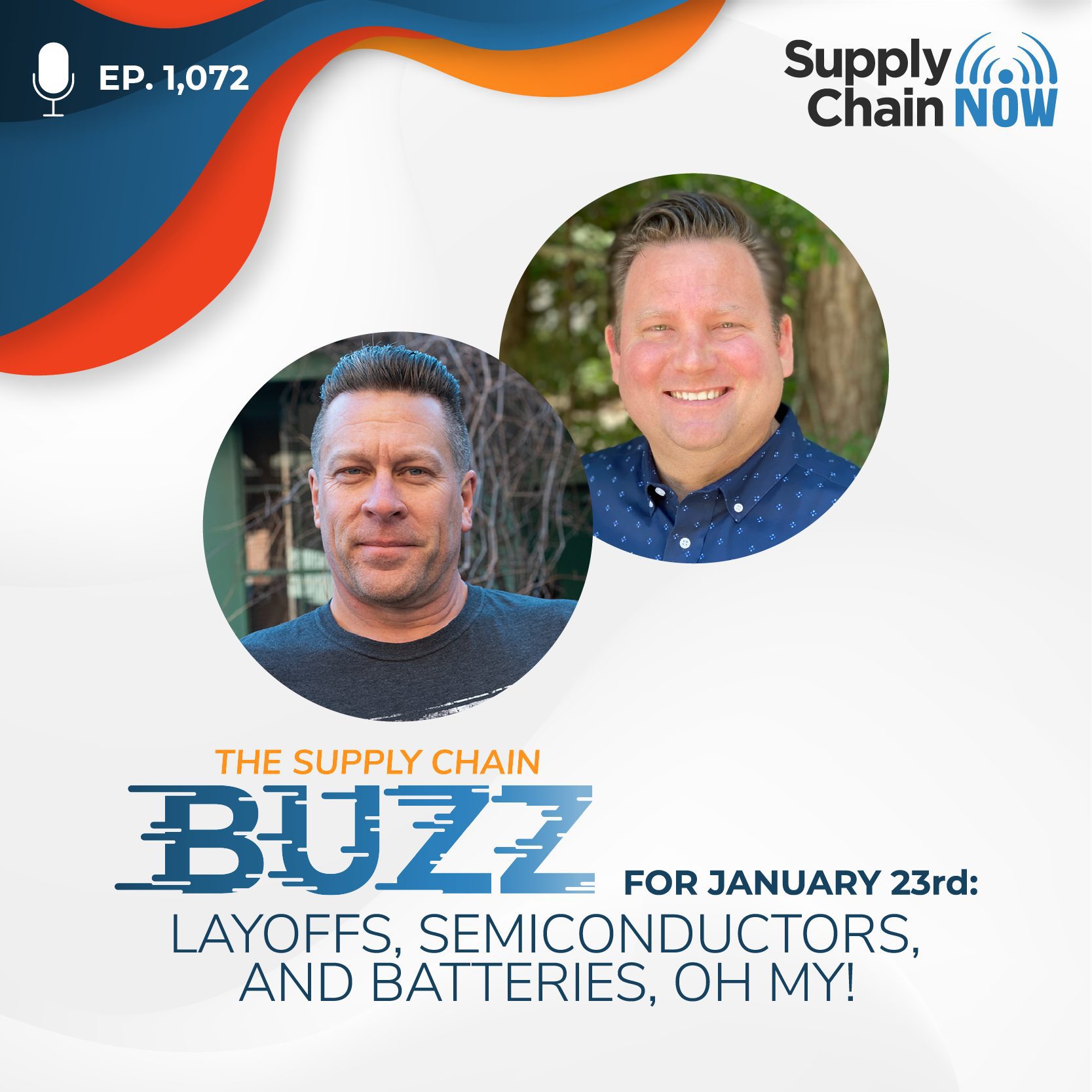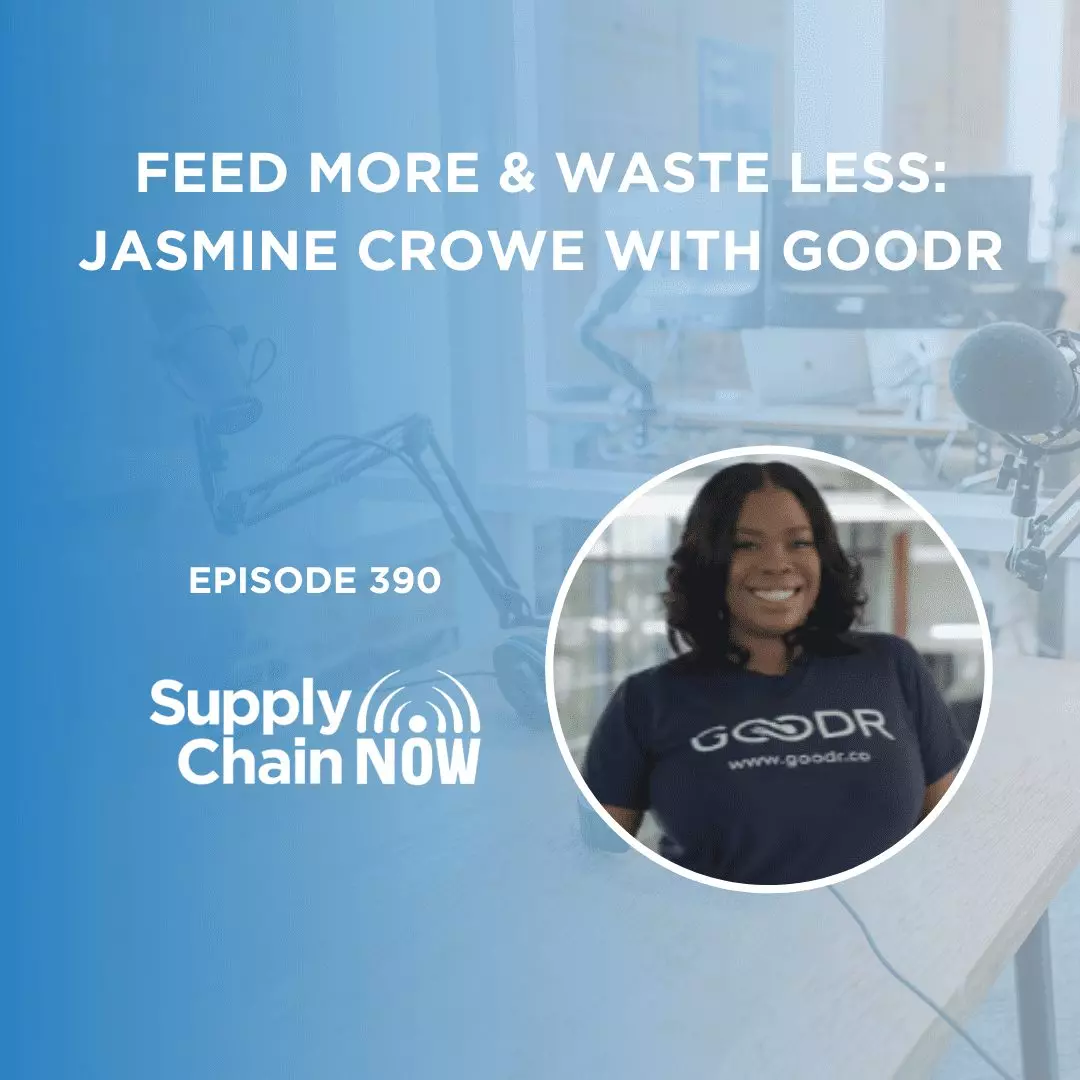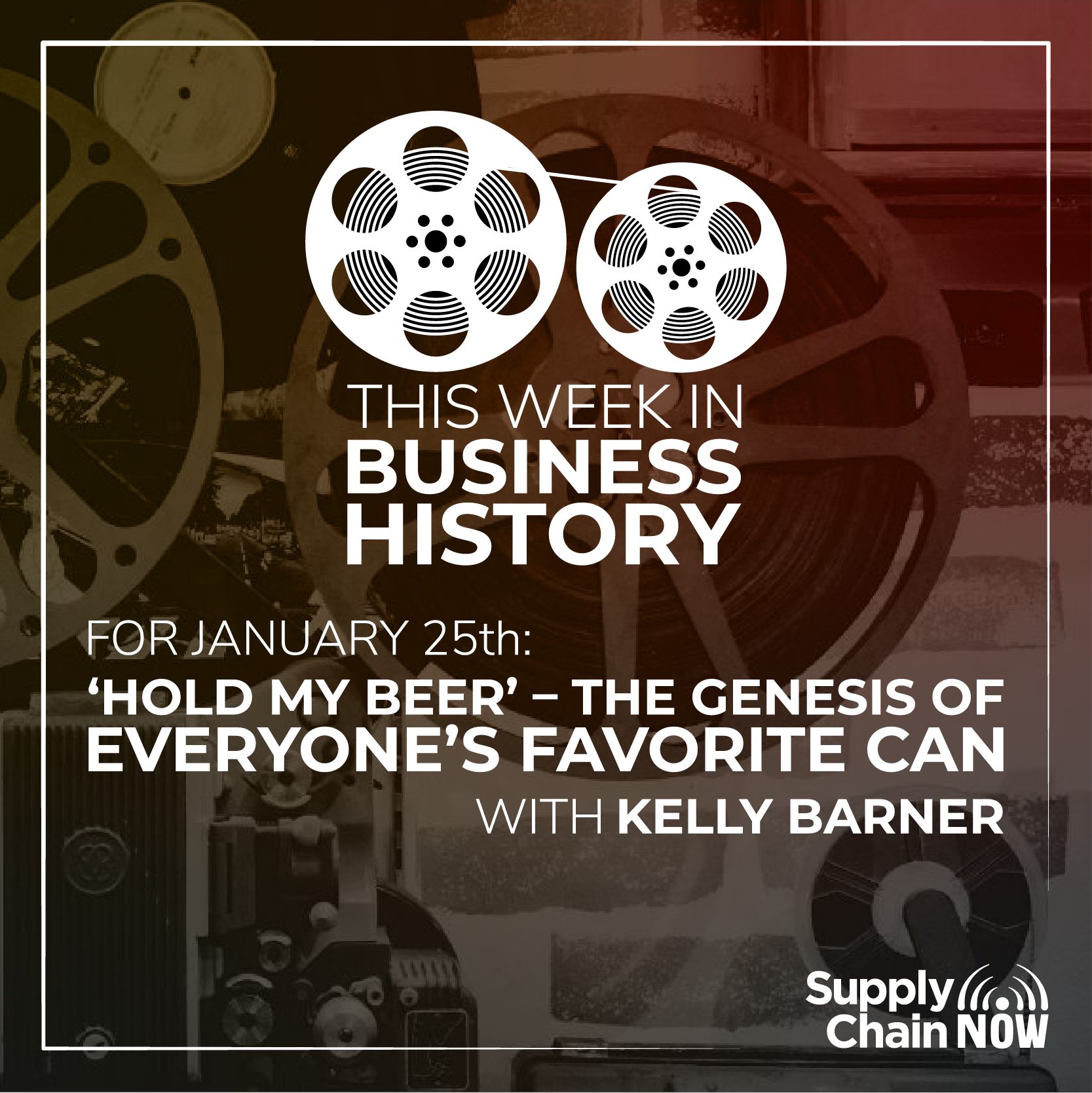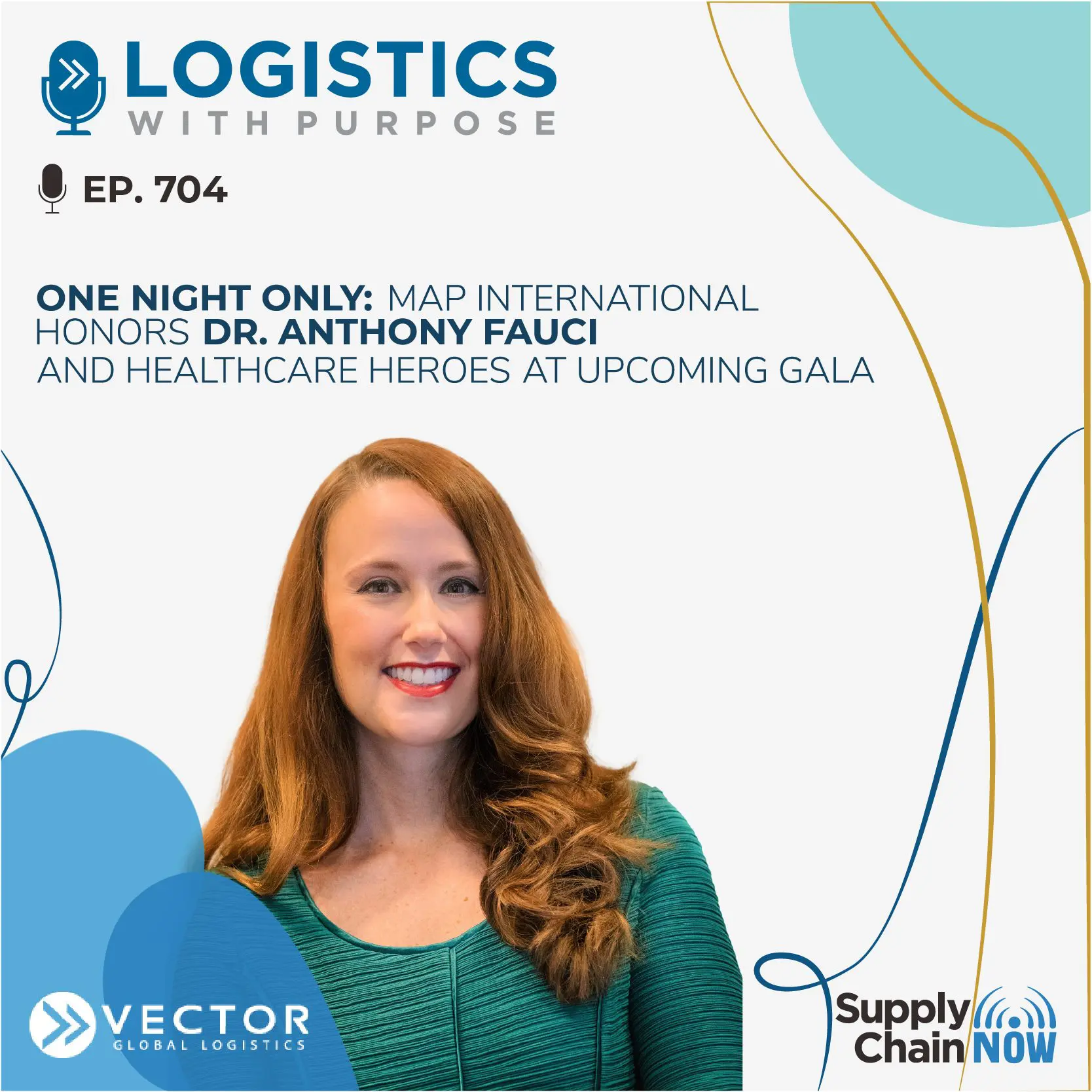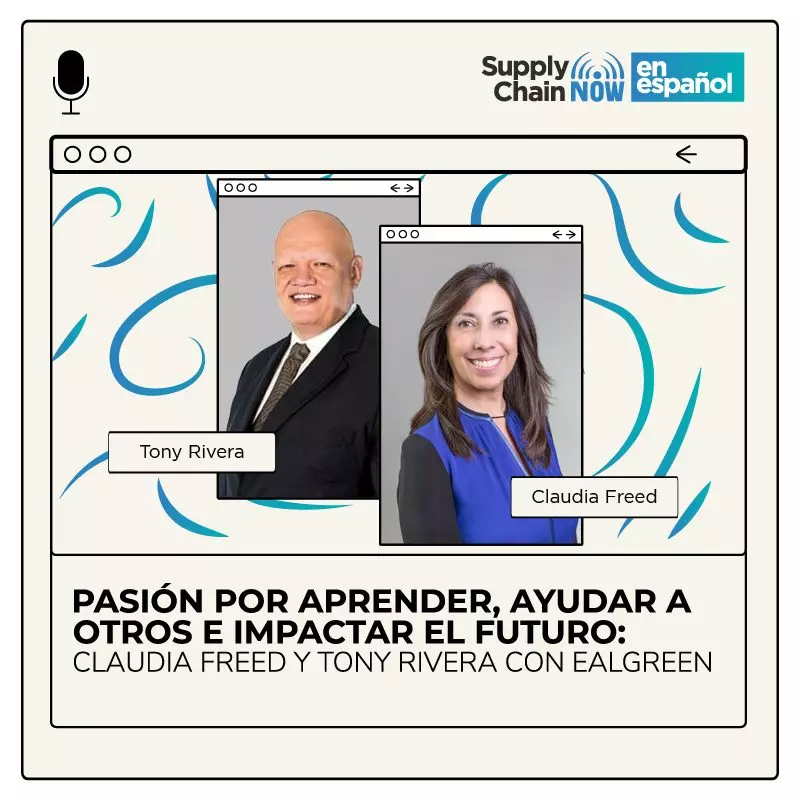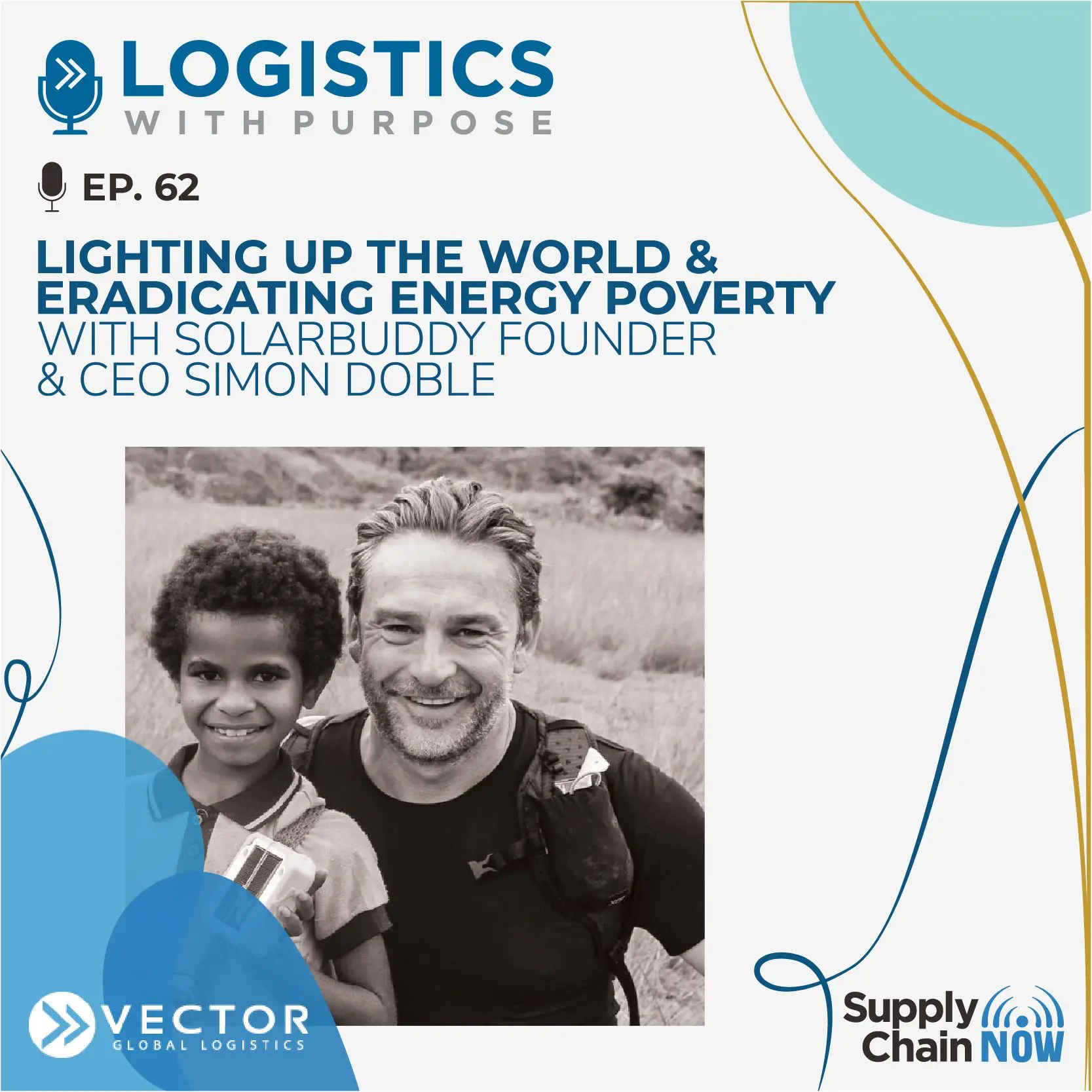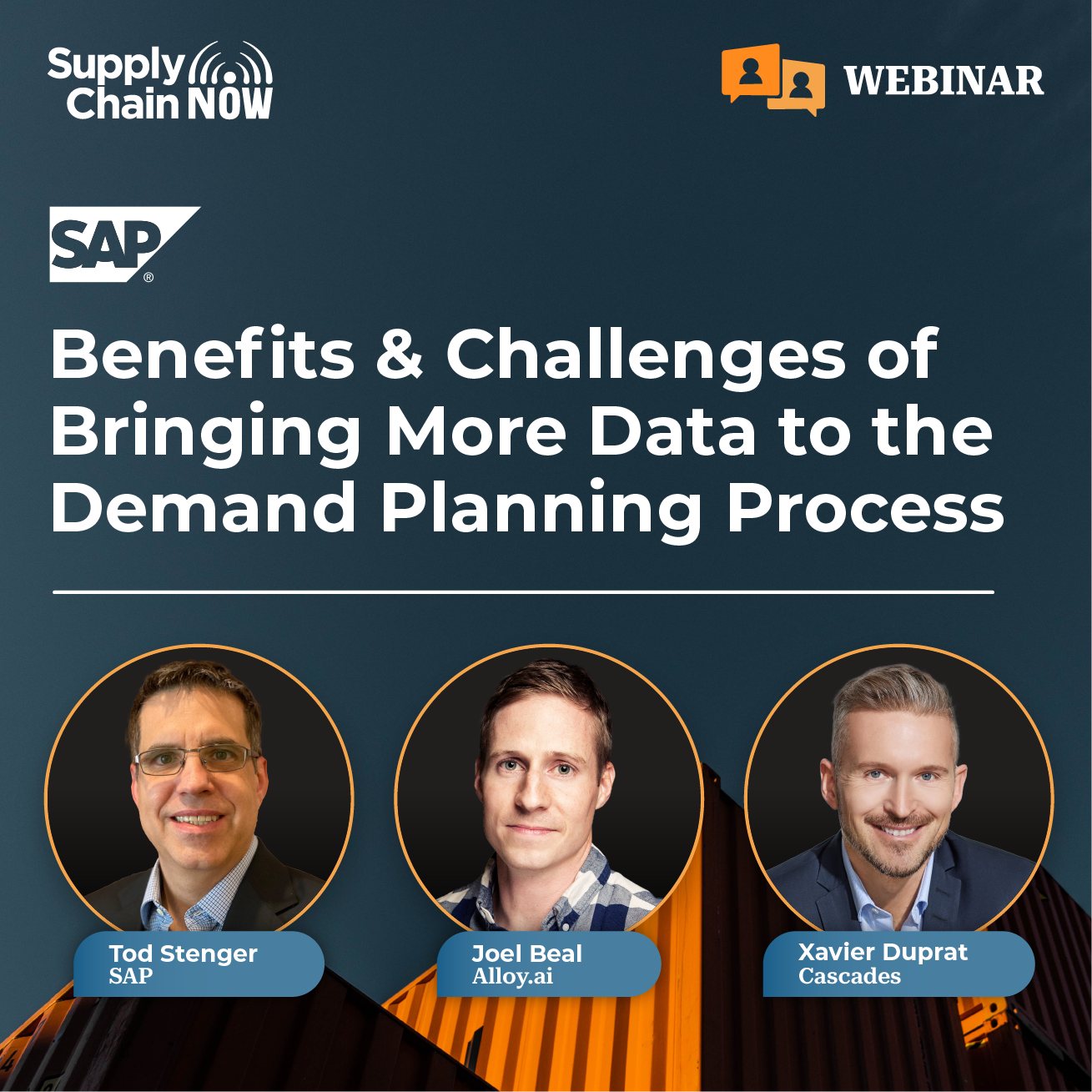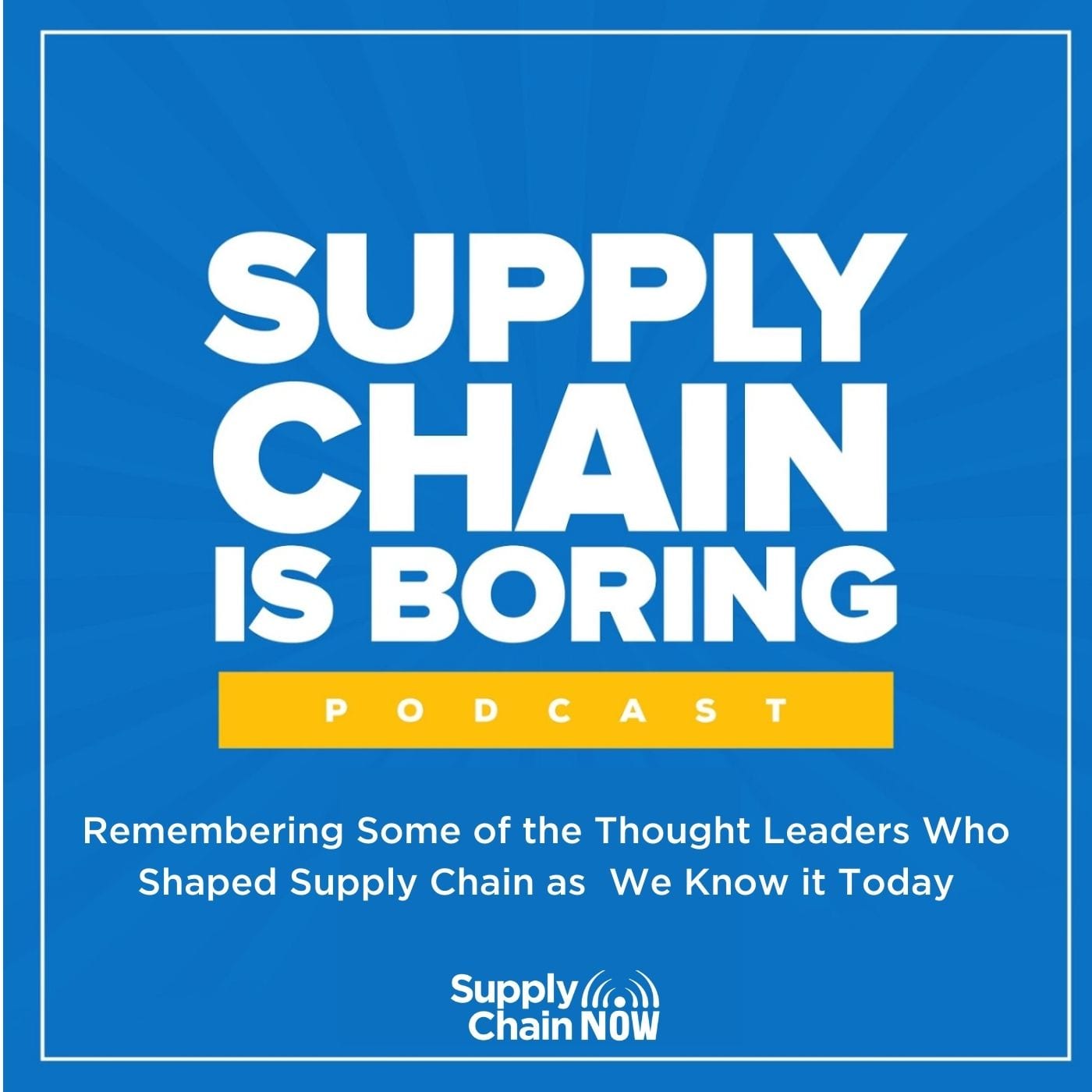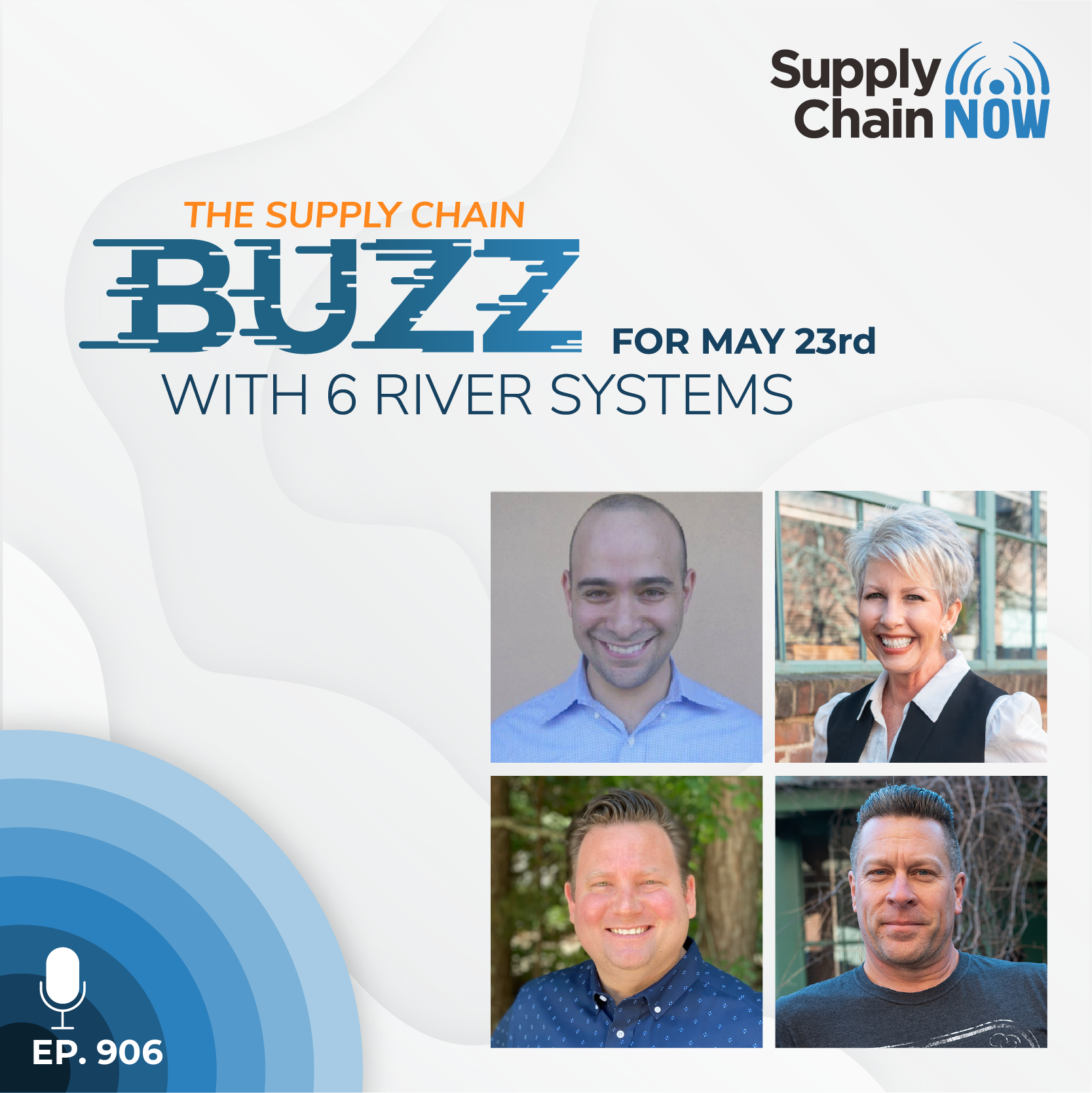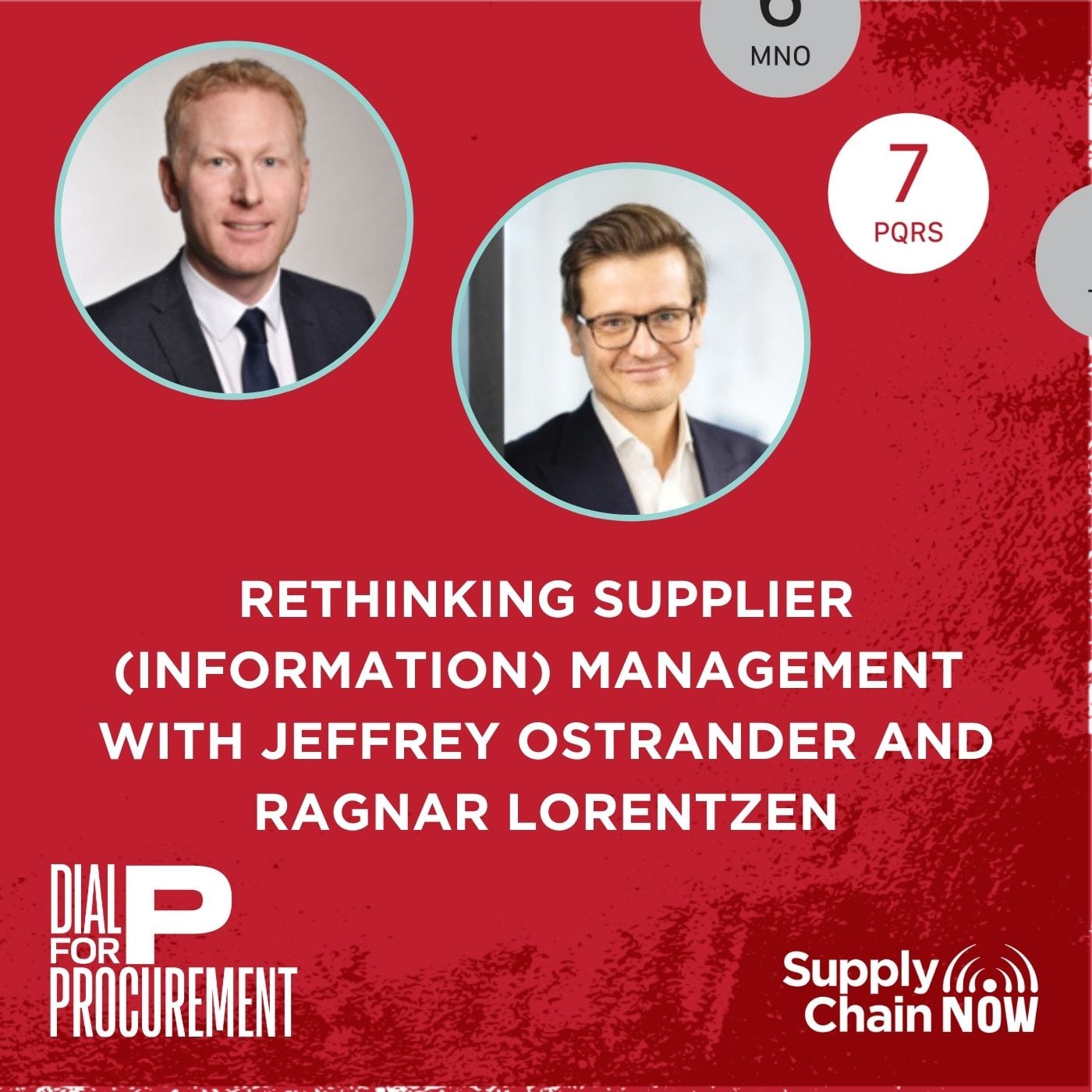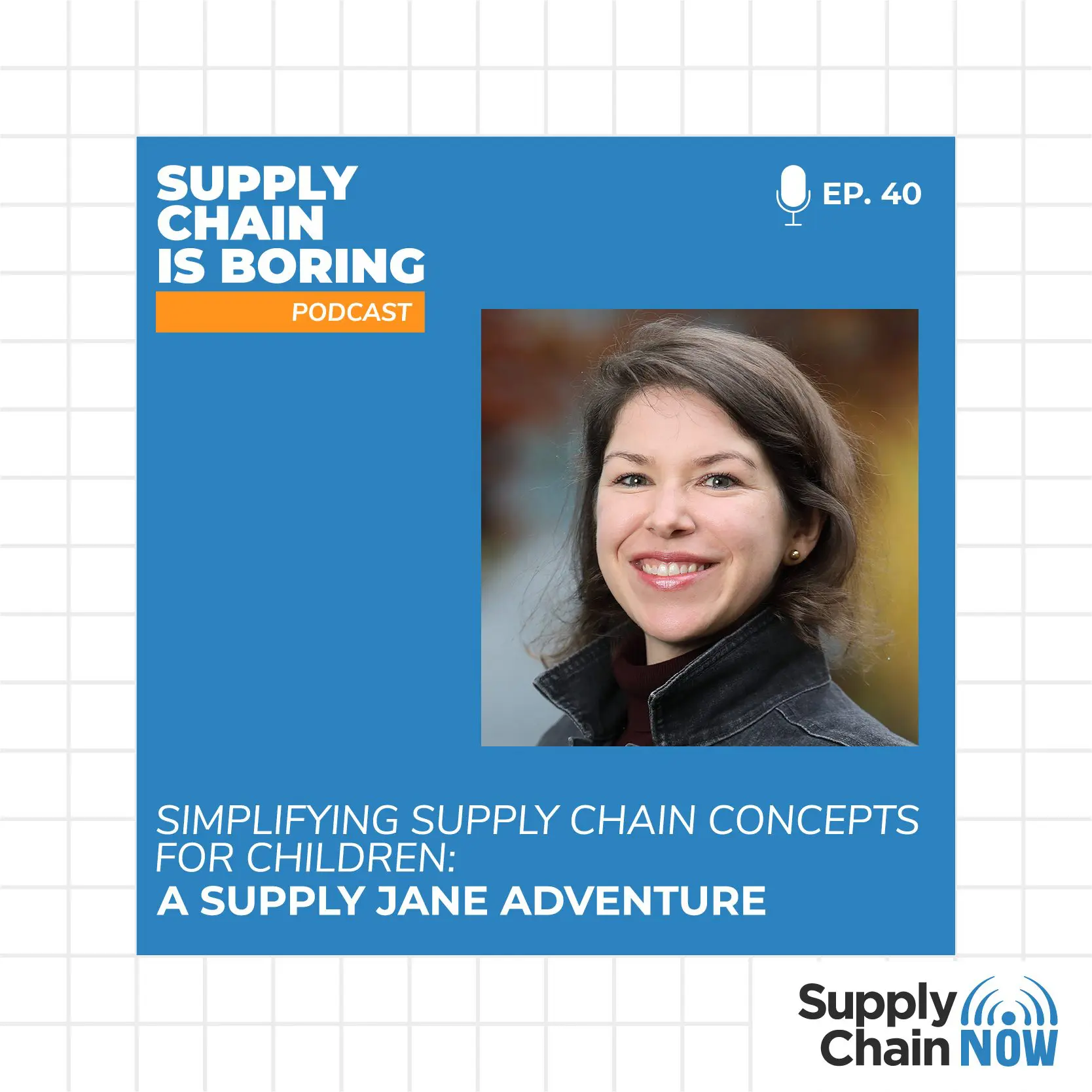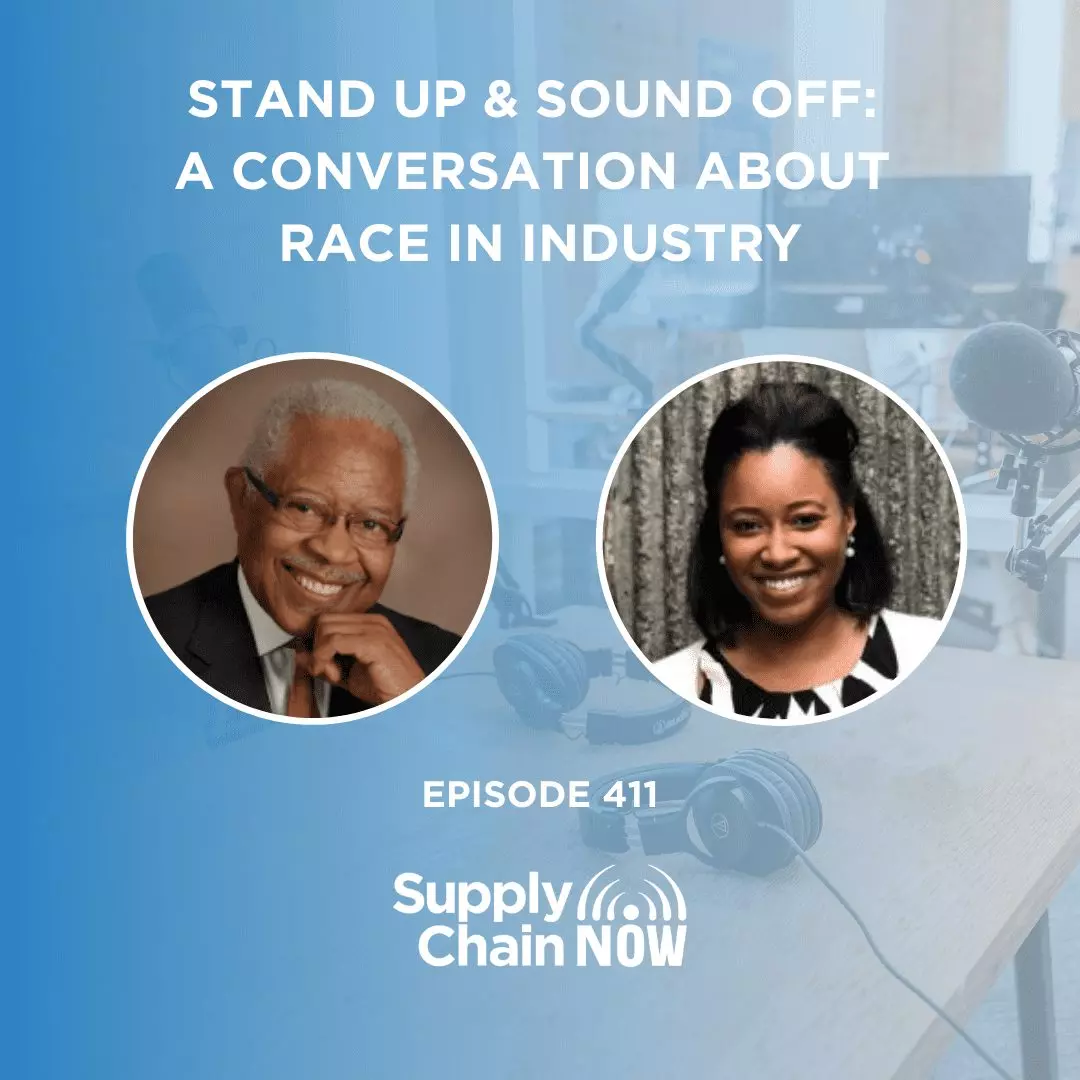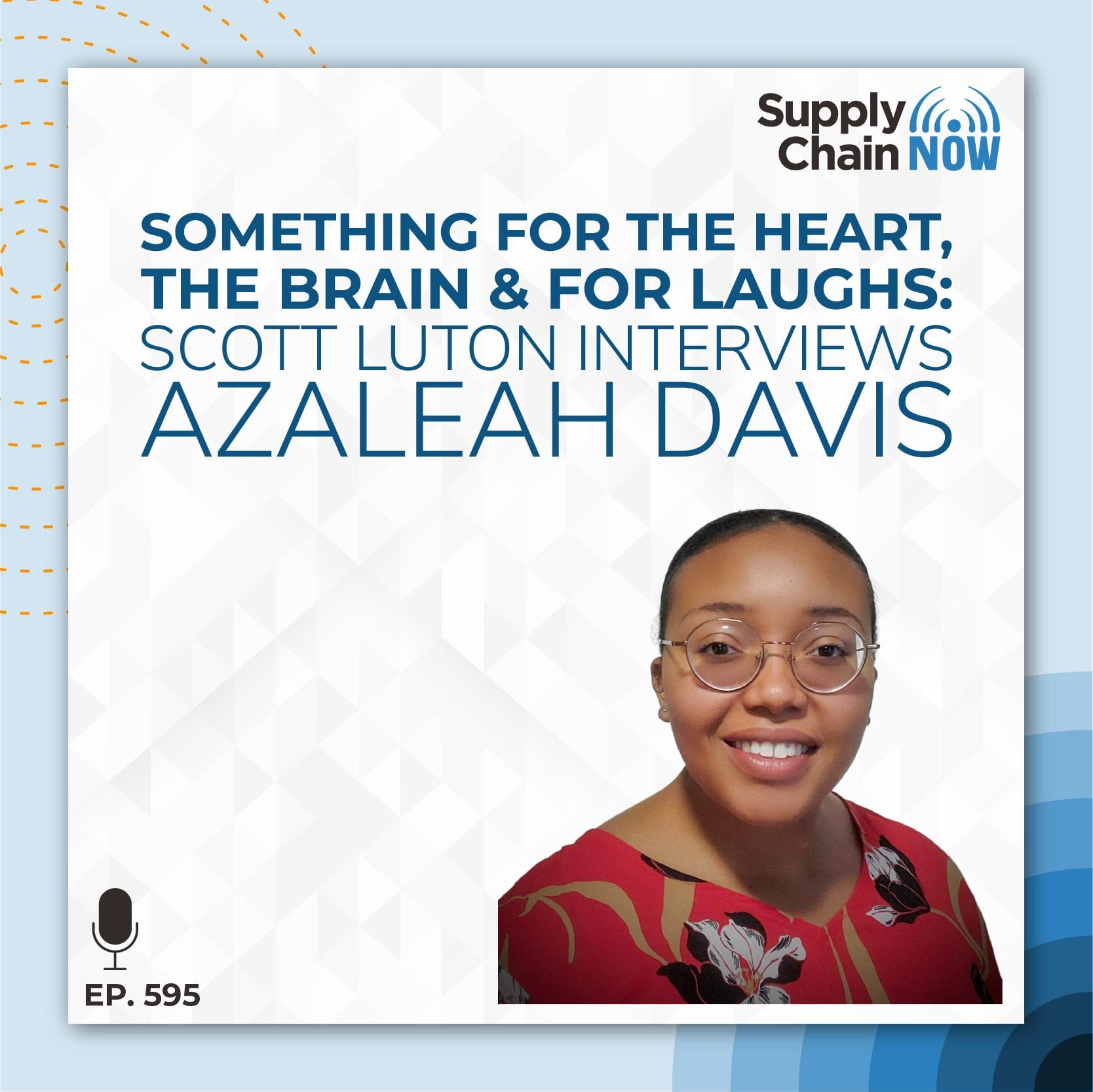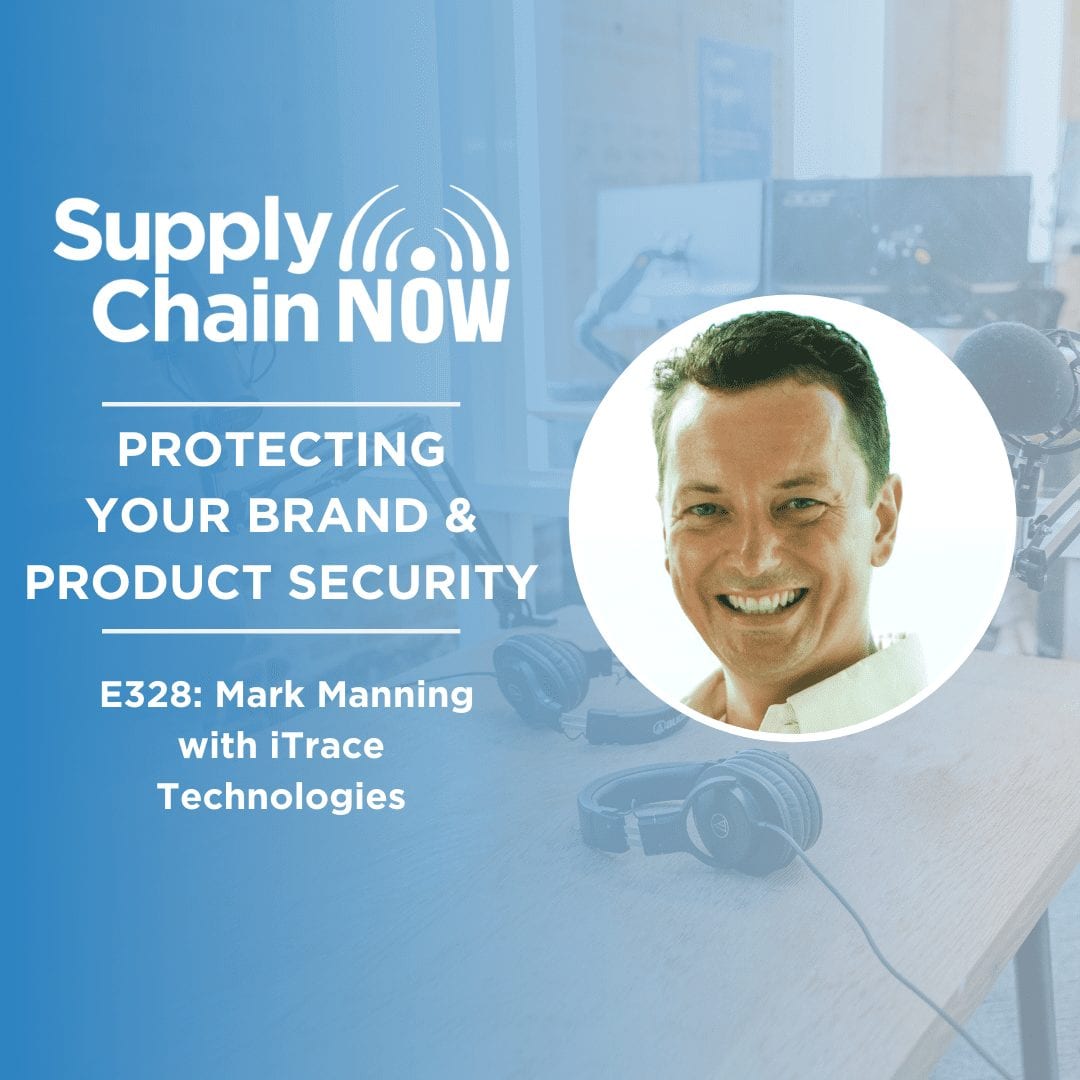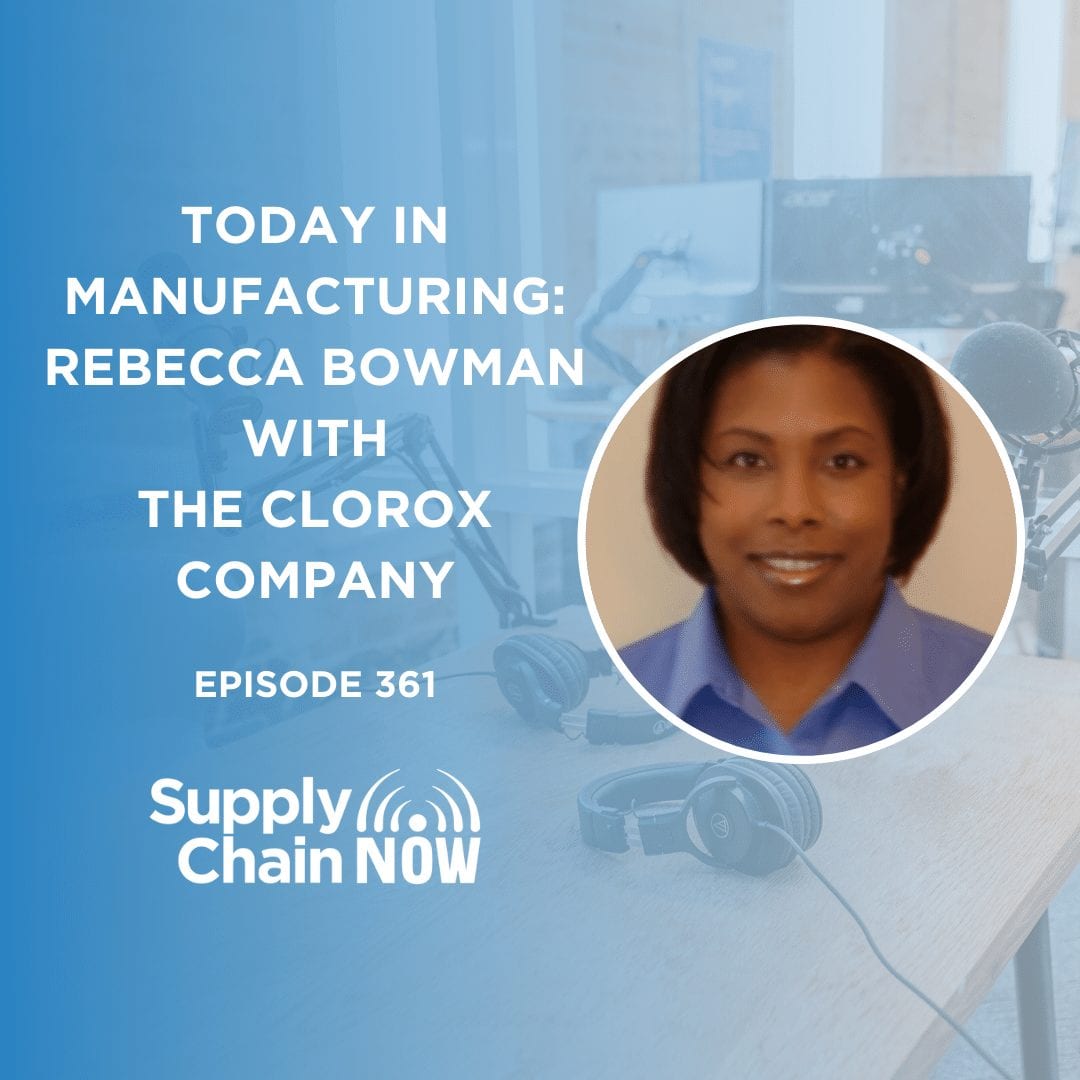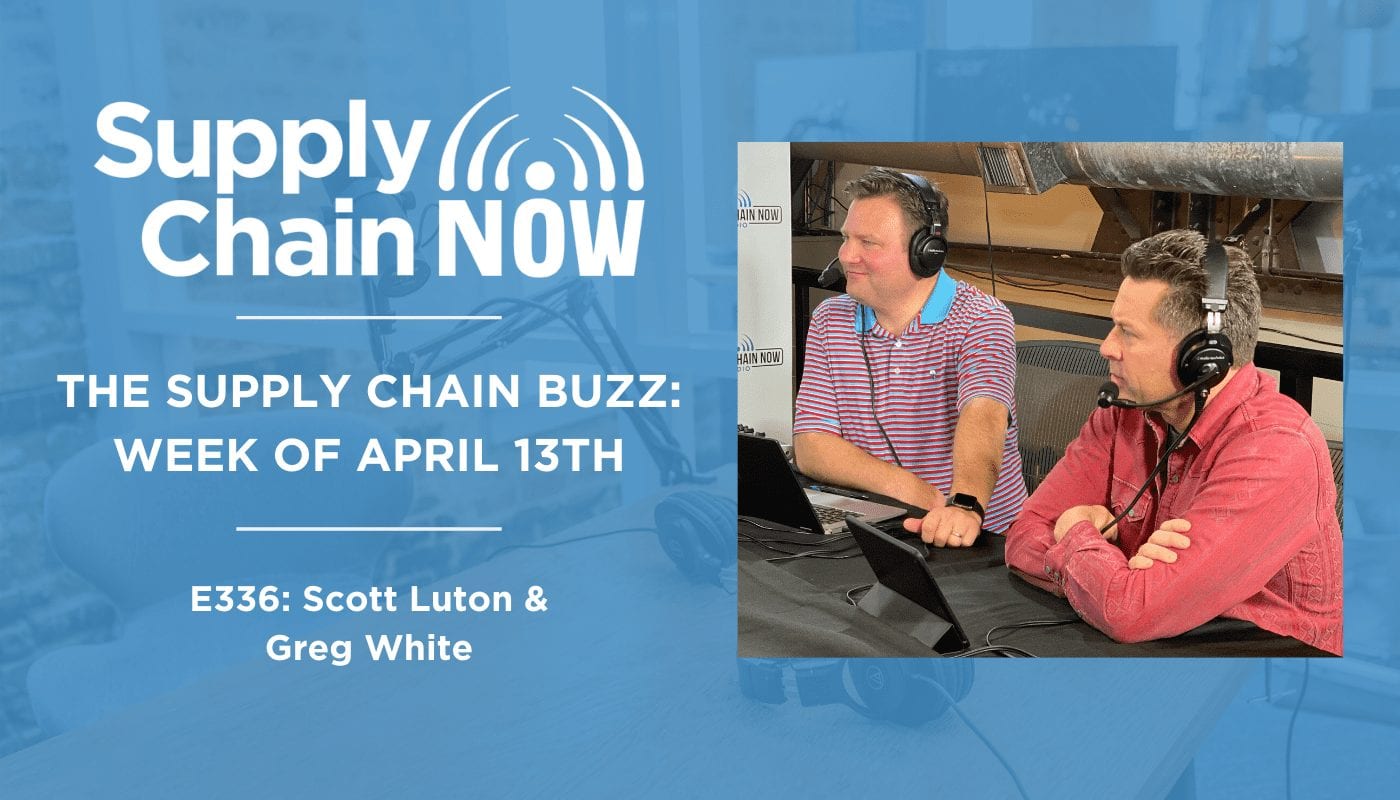
Episode Summary
On this episode of Supply Chain Now, Scott and Greg cover the top news in supply chain for the week of April 13th.
Episode Transcript
[00:00:05] It’s time for Supply chain now broadcasting live from the Supply chain capital of the country. Atlanta, Georgia, heard around the world, Supply chain now spotlights the best in all things supply chain the people, the technologies, the best practices and the critical issues of the day. And now here are your hosts.
[00:00:29] All right. Good morning. Scott Luton and Greg White with your supply chain now. Welcome to today’s Livestream. So on today’s show, we’re relaunching our popular program, The Supply chain Buzz.
[00:00:41] It kind of tweak things a bit, mainly because we want to engage our audience more and we want to go deeper in some articles and then some of the developments that we’re Sheer. So this series, of course, is dedicated to presenting the latest, the most important developments across the global Supply chain community. You’re going to find the buzz love on a variety of platforms LinkedIn, Facebook, Twitter, YouTube and Twitch. Every Monday morning at 9:00 a.m. Eastern Time, Greg White and I will spend about an hour going through engage in unique comments, so checks out every Monday at Niland and we’re probably going to be publishing these as a podcast and if they are too EFT Lifestream. So you’re trying to make content as convenient for our audience as possible. So quick programing note. If you enjoy today’s livestream, check out our podcast, where you podcast from today. We published an interesting discussion with Rod, The Apple with SCMP talent group stemming from a mutex conversation we had. You can check that out and subscribe or every year podcast from. OK, well, welcome. No. No further ado. Welcome. And my fearless esteemed co-host here, de Greg White, serial supply chain, tech entrepreneur and trusted advisor, Greg. How you doing?
[00:01:59] I’m doing great. Got a quick note on Romney Apple. Supply chain focus talent person and really, really knowledgeable about Supply chain, so that was a really interesting talk.
[00:02:15] Yeah, it is a great conversation. The guy gets so much more than you do out there. He’s been doing it for a long time. He’s that the apex coach when it comes to talent and recruiting. So great conversation. And he’s writing a new book that I’m sure is valuable received by the market.
[00:02:31] So he knew he would he would say we were being generous about writing it. Right? Right. He was still honestly still contemplating it a bit. But I know he’s got something down on paper. And from what he gave us, as far as an outline, it’s going to be really valuable.
[00:02:49] Absolutely. I can’t copy.
[00:02:55] So, you know, we should say. Kidding aside. So last Easter Sunday and into the early morning hours were beyond the challenging environment ran for so many in the U.S. Southeast. We had a bust. Bad weather system come through, especially impacting Mississippi and Alabama and Georgia. And I think in Mississippi alone, six folks, I think all lobs before Sunday was even done with Greg. How about you? But our family was up into the wee hours. You know, we weren’t in the clear till about 3 or 4 a.m. so it’s been a long day. But most importantly, from the whole supply chain, our team, our thoughts and prayers are with those in the Chattanooga area. You know, all the all the impacted families. So. And you are on your other side. You’re on the western side, right? ORZULAK In your neck of the woods, it was very windy.
[00:03:53] We got a lot of wind and heavy rain. We’re right next to a feeder creek to a major league lake here. Altitude Creek, which feeds Lake Altoona. And the rain was heavy for a good while. The wind was heavy being from Kansas. It’s almost like I’m a human barometer. I never cry. We were near a tornado cell. I mean, and the radar didn’t show anything. We were in fact, it seems like the most. The heaviest of the storms were near the dogs area by Doulton, up north towards Chattanooga in Iraq, real important got hit in Chatsworth, just east of there. So six souls lost there. But again, our prayers with them. But, you know, it was it was very heavy and it probably went on for an hour, hour and a half. And then and then Vicky and I were awake. So we kind of watched it progress. We finally, I think, got back to sleep about the time we felt like it had passed, you guys, east, north and east of Atlanta. So it was hard for everyone.
[00:05:05] Absolutely tough. And, you know, the all the damage reports have just, you know, now that, you know, it’s daylight, but we’ll get a much better, more accurate understanding of just how extensive the damage was. A big, big kudos, all the weather teams out in Atlanta. There are numerous state up through the night, you know, identifying each threat. You know, we’re all the good information that in this day and age. And I really appreciate that. So with no further ado, want to a couple of folks already joined in. We have Kyle. Kyle, good morning. Great to have you. Last week on a couple of livestreams, Joachin. Good morning. Hope you’re doing well. Great to have you here. And it should be. Before we dove into the developments, we’re contacted. They should know. Greg in out really want to invite our audience, his comments and observations. And we’ve got six stories teed up that we’re going to walk through. Greg Zand, lead off with a really interesting story related to the U.S. Postal Service here momentarily. But to our audience, what we take taken as many questions because we’ll never really worked through the hour. But give us your comments. Give us your observations on the stories we’re talking about or your your quick, hot analysis. We’ll take that, too. I really appreciate all of you being a part of our lives from your spot, you know, so great for starters. Yeah. Talk about this day in history. April 13th, 2010. See, if we can’t, we can stop Greg the swami. And we should go back. You mentioned dog. So to our audience, you may be familiar with Clay Phillips, who’s a valuable member of our team here. He has earned that nickname very well. He is the quarterback extraordinaire of Supply chain now, along with Amanda over here, who’s engaging members of the community across the social media channels, Journal of Strange. But if you hear us refer to the dog, that is the quarterback. All right.
[00:06:58] So April 13th. Twenty twenty, Greg, on this date in nineteen sixty, the US Lotte’s Transit One B, which happened to be the world’s first satellite navigation system, which essentially the predecessor to g._p._s on this date and not not a 7 on all of us are missing our sports right now that we’ve talked about that a couple livestreams, the Masters golf tournament that’s held this time here in August has been pushed back to November. But on this date in nineteen ninety seven, Tiger Woods becomes the youngest golfer ever to win the Masters Golf Tournament. We’ll look at how different countries are celebrating April 13. What it is states. It’s Thomas Jefferson’s birthday in Ecuador is teachers day. And in Slovakia, April 13th is unfairly prosecuted person’s day. Greg, thank you. You know, a little more background. I do.
[00:07:52] Yeah. So I was a Soviet specialist in in college. My degree is in political science. Not supply chain surprising. And that was one of the many protest type moves that at the time Czechoslovakia, now the Czech Republic and Slovakia made because of the persecution by predominantly Russian Soviets and others. But an interesting interesting that you chose that one, because that’s that’s that’s one of the few that I’ve studied somewhat. But also, hey, Tiger Woods winning his first masters. I don’t know if anyone else remembers that, but was a big day. We just just like last year, I mean, it was last year was almost as amazing as the first year.
[00:08:51] And to our listeners, that may not follow golf. So nice, ’97, Tiger becomes the youngest ever to win it. And then last year, in a heroic, you know, triumphant return. Yeah. Won the Masters again. And of course, there’s a couple other just few other wins. That’s true. Yes. I wonder how such a great story is such a great memory that that’s positive for someone to follow golf. So. Well, that said, Greg, now we’re going to dove into the buzz and you’re going to leave us off with the. Our story related to the West. Yes, right.
[00:09:26] Yeah. So we talk a lot about the various carriers on our shows frequently. Obviously, the United States Postal Service does a lot of the last mile delivery for that, not only for themselves, but also for other carriers. And they have, because of Corona virus, seen some pretty substantial issues over the last several weeks. And in fact, last week their volume dropped 30 percent. And they’re expecting it to drop 50 percent through Q three and four. And Postmaster General Megan Brennan has asked has predicted that they’ll be insolvent by September and is asking the government for seventy five billion in a combination of grants and loans and funding. So the U.S. Postal Service, for those who don’t know, is is is an independent agency. So it’s not exactly an independent company. It’s a segment of the executive branch here in the US anyway. And so it has to apply for funding even in times like this. And Virginia Democrat Gerry Connolly said that technically the postal service is insolvent, at least here in the states. In case you’re around the world, at least here in the states, it’s pretty widely known that they have a substantial burden from retirement that they owe to previous workers, and that’s a big part of their problem. On another burden that they bear. Is this last mile delivery companies like Amazon, FedEx, U.P.S., basically, and the president is not a big fan of this, basically dropped their boxes at the door of the post office and say, you take this the final mile. So that’s obviously delivering to every address in America. Every day is pretty burdensome. So it’s a it’s a pretty big issue for the organization.
[00:11:39] Gregg, reading through the article, clearly this has got major residential and commercial repercussions by Jeff Bezos. And then this is two to the representatives point of the organization has been solved. This is nothing new for many folks. I’ve been tracking the USPS. But what I’ve found to be interesting is that they have some projections from the government agency and say that the coronavirus is looking to call some organization on top of its current troubles. Jerai four billion dollars over the next 10 years or $10. Holy cow. So what do you think the.
[00:12:23] Now, I don’t think I don’t think that we will let the U.S. Postal Service collapse, it’s been it’s been a funding burden for decades and decades here in the States. I don’t know if there’s any way to remodel it one. So one third of the seventy five billion dollars that the Postal Service is asking for is for modernization. There is a lot of inefficiency and a lot of efficiency that could be gained by modernization. They would need a lot of intervention to be able to accomplish that. You know, obviously that’s a that’s a big transition. I think something like that will happen. I think some combination of raising rates, which of course, we’ll all pay for. Right, may motivate may motivate other carriers to deliver. Door to door all the way to the final mile.
[00:13:18] All right. Well, do you suggest, you know, nothing short of transformation is probably what’s needed in this case, really solve it systematically. But we all know the challenges that exist with trying to transform any government agency, regardless anywhere in the world. That’s not just unique to the U.S., big or small. I mean, the challenges are are insurmountable, but close. So we’ll see. We’ll keep our finger on the pulse of this development. We’ll see just how far the administration and Congress wants to go to to pump some resources into the USPS.
[00:13:56] Well, you know, privatization has been mentioned. Not there’s a lot of hue and cry around on both sides of the aisle around that and then some additional loans and some other actions that could as well. So there are lots of things that need to be talked about.
[00:14:14] Agree. All right. So moving right along. Maureen moving to our second story here. All supply chain buzz. Many of you that are watching this livestream and certainly many of you that are in Supply chain saw this news like we did, came out last week in a report from one of our favorite resources, Armacost Group over at Supply chain Dove Move was announced last week. Amazon has chosen to temporarily pause its Logistics service known as Amazon Shipping. So this is a segment of the sprawling e-commerce giant that delivers non Amazon products. And really, this is a really directly competes with companies such as U.P.S. and FedEx. The service was only available in major markets in North America, and it looks like the freeze will take place in early June. So some, you know, some of the commitments they’ve already made. And they’ll see those things through the next couple of months. Amazon has stated that move is not related to konbit 19s impact on the organization operations here. Here’s one other interesting tidbit that I found in the Supply chain D&B article. Matthew White with Eyedrops Logistics was quoted as saying. Greg, I want you to weigh out. I’ll take your quote in our view. Amazon has never had the intention of truly competing for volumes outside of its network.
[00:15:38] The beauty of Amazon Logistics is that capacity flexibility it provides for the Palm Channel, which is subject to substantial peak seasons where delivery performance is critical to overall brand input. The same analysts why are strategic thinkers as official title? White also stated that Amazon shipping was essentially a hedge bet against volume weakness in slower periods. Greg, how does that how does that strike you?
[00:16:08] No relation. But let’s let’s start with that. And secondly, I don’t think that’s a strong analysis at all. I mean, it may be that for now they expect it to be a hedge bet in and they may fall into a bigger business. But I’ve I’ve been fairly involved with in in the recent past with Amazon’s expansion, and they were clearly intentionally building excess capacity over what they were doing in prime. And I would argue in some cases by orders of magnitude over the volume that they saw and even expected to see. I can’t tell you that I’ve heard that from anyone at Amazon. But when you look at what they what the pace with which they are expanding their network and the pace with which prime sales are growing, they have to be provisioning much like they did with a W.S. Amazon Web Services was originally a simply a bunch of servers to to enable their e-commerce marketplace much more effectively. They they meant they built and and identified excess capacity and then started selling it. And I reckon that they will do the same thing with this three service. It’s interesting, though, that that they have pulled back from it some weeks, maybe months ago. Now, we had a discussion about my speculation that one of Amazon, FedEx and U.P.S. would not continue to be in the parcel, at least the parcel business in the future. And all I can say is I didn’t pick Amazon to be the one who didn’t make it.
[00:17:54] That was a great conversation. We had a month or two, but not with our from Robertson, right? That’s right. Very frank discussion will have to have her back on it later on this. But she wanted it sweet way.
[00:18:09] I loved it. I wish you would do it more.
[00:18:14] I want to recognize a couple of folks. Great to have you again on on the livestream Singleton and only Jenny lab. Appreciate you. You listening. And I’d love to have your observations and thoughts on these stories. walk-through. Also a dear friend of the show, David Mantz, going back to the first article about the USPS. You’re right. I think they I think a lot of government agents, especially those who been around as long as the USPS has that has struggled to keep up and stay as relevant and up at the Times is probably facing similar issues. So good stuff there. Hope you and your family are doing well.
[00:18:52] Can we address that very quickly, Stasia? I think I think that David makes a really, really good point. We have seen similar issues with other postal services in other countries and they have diversified in order to in order to not just survive but thrive. DHL, the largest logistics company in the entire world, is the German $post Belgian Post Bought Radio, which is a large Amazon alternative fulfillment mechanism here in the States. So there are I mean, there are ways to not just prop up these these entities, but to build up these entities and to make them viable businesses and in a post office position, fairly well to do that. Being an independent agency, they do have the possibility of doing that.
[00:19:46] Excellent point. Great. All right, so moving right along. Story number three, we’re going to talk at all packed in a rush. Greg Greene Sheer.
[00:19:56] More so before I really hit the headline here, I think one of the things that really draws my attention to this is the magnitude of this deal. And I don’t think that it can be overstated. The oil can be overstated and it probably will be. But I think it would be difficult to overstate the magnitude of this in pulling both OPEC and non-OPEC companies.
[00:20:22] Are our countries together to make this agreement? So this is the upshot of it, is OPEC is going to cut oil output by 20 percent, which is about nine point seven million barrels per day as late. They agreed with sorry, they agreed with other non-OPEC nations like the United States, Canada, Norway, Brazil and other major producers who will also cut production by 20 percent, which is the reason that OPEC felt comfortable doing this his latest Thursday. Mexico was a holdout on this. And I don’t know if anyone was following this throughout the week or over the weekend. But on Saturday, Mexico relented and and they were able to put this deal together. And overall production will come down about 20 million barrels per day when you include the non OPEC nations. That’s about four times the largest prior cut, which occurred in 2008 during the economic crisis then. And obviously, this helps preserve jobs in some of the markets where oil production is much, much more expensive to the states. U.S. states being one of them, Canada as well. Norway to some extent as well.
[00:21:41] So really a strong partnership move by all of these countries and of course, the OPEC cartel to to make this happen and really do it to the benefit of all of us.
[00:22:00] Frankly, it’s all about global stability. We’ll see or see deals like this. Is that right?
[00:22:05] Well, it is. Look, you know, OPEC in the states have been at odds in the past. They have intentionally driven down the price of oil because because oil production is more expensive in the states and in other countries.
[00:22:21] But I think they recognize that the the level of volume drop here, which is over 30, 30 percent since the pandemic and these various lockdowns have occurred. They recognize that even they are vulnerable and have been driven to the table and and stepped up. And frankly, it was a big move by the states and other non-OPEC countries to agree to do this, because in the past, that has been difficult to achieve.
[00:22:52] Good point, Sarah. So really quick aside to Keith Singleton, who is tuned in via LinkedIn, Gates been on the show before, a longtime friend and Apex colleague and board member. So Keith UPS, you and your family are doing well. Thanks for tuning in. All right. So we’re going to be moving right along. And to our audience, we can’t tell. We’re trying to share more and uses this. This is toll here more effectively and show and show more visuals. I need to get my driver’s license and figure out how to use this a little bit more effectively. But we’re getting a. All right. Rick Scott. OK.
[00:23:36] All right. And again, to our audience, you know the freeway in give us give us your take on these stories. You know, clearly Greg White are giving you our thoughts and instant brief analysis. Weigh in and tell us what you think. All right. So in our four story here, we’re going to talking about the Supply chain workforce and supporting work for some major meat processors, shutting down plants as employees are getting sick with COBRA 19. So this is a CNN report via CBS affiliate Channel 3. And it’s again, it’s all about the industry and industry workforce that we’re trying to protect. We’ve been we’ve been pounding the desk on this point for weeks now. It is so vital. So several major meat processors, meat processors shut down plants in the US last week due to employees getting infected back over 19. Tyson was the first one since suspended operations in a pork plant in Columbus Junction, Iowa, after two dozen workers got sick. Their j.b.’s USA also stopped operations at its beef plant in southeastern Pennsylvania. Sciarrotta. Maybe soda? I’m not sure. I’m sure we’ll we’ll find out. We’ll hear from somebody and let us know. Gates several management team members at that plant got sick and stopped before. Stop feeling comfortable to report to work. So that plant must shut down. Cargill halted operations at a protein plant in Hazleton, Pennsylvania, as well. In terms of what that was all about, quote, minimizing the impact of COBRA 19 and quote, said John Nash, North America lead for cargo protein.
[00:25:20] So big developments here. You know, big developments, whether it’s our meat plants, whether it’s our truckers, whether it’s our fulfillments, our employees, we’ve got to keep this workforce safe, just like just like our health care and first responders and and other critical parts infrastructure. The good news is, is following here. Christine McCracken, which the senior analyst of animal protein. How about that for Rabobank, said that we should we should not expect any shortages for the consumer, mainly due to processors that were selling to restaurants. Well, they’ve been selling that to retailers centers, lots of siplon. However, McCracken is concerned about how many more plants will have to follow suit and shut down, even temporarily saying, quote, We just hope they don’t all overlap at the same time in quote. So there is concern in industry by a number of folks around the threat of cattle and pork producers and others running out of packing or processor option options. And, you know, two points here. Greg White we talked about last week, which was kind of in a blind spot, at least for me, you know, as these producers are growing the livestock. You know, that’s that’s a very specific supply chain and timing cycle, right? Yes. Certain age.
[00:26:42] And then they can’t be altered. Right.
[00:26:44] Right. Right. And so if they run out of options to send the last drop livestock, it backs up and becomes a big challenge really quick. So that’s point number one here. And in point number two, again. We can’t say this enough. This story illustrates the point we’ve been trying to share and and shout from the mountain top. For weeks now. Gotta take care and protect the End to end Supply chain workforce globally as, of course, as well here in the state. So we can’t talk about that enough kallikrein.
[00:27:17] Well, I mean, if there’s any blindspot any of us had, I think some weeks ago, I said you not have been interviewed by a number of people, USA Today, CNN and many, many others. And I think what we have consistently said is the supply chain will not break. I think if there’s anything we didn’t consider strongly enough, it’s the possibility that people are not comfortable coming to work in. Daniel Stanton started mentioning that last week in some of the discussions that he’s had and we’ve seen some of that. So that’s probably the weakest link. And yes, anyone, whoever you are in the supply chain, be you a retailer or a distributor. Meatpacker parts, raw materials, producer. You’ve got to protect your workers in order to keep keep that those processes going. We’ve talked a lot about automation over the last several weeks as well, but there are certain things that cannot be automated, at least not right now. So there you know, there are some. These people are on the front lines, first of all, it’s just the right thing to do. They’re not you know, they’re not less exposed than health care workers. You know, if you get if you go into a grocery store or Costco or whatever in the last few weeks, you’ve seen it.
[00:28:35] Right. And, you know, on that note, be on it. You know, I think we start to see good news. It starts in some of this sentiment spill out across social media about how we need to love all our retail employees got level those cashiers that the stockers, you know, those folks that to your point, that getting exposed. But they know and certain their organizations know the value of keeping these these these shelves as full as possible because of how that plays into our psyche, not just here in the states, but globally. Right.
[00:29:10] Right. And we’ve been we’ve seen, at least around here, we’ve seen the shelves of meat products starting to fill and maintain inventory levels. So, you know, it’s interesting. I don’t think catastrophic, but certainly it’s a portion of the supply chain that we have to think about the people who perform these activities.
[00:29:36] A great cook shot up going back that first story. You let off with as triggered a lot of comments here. So going back to the story about the U.S. Postal Service, our friend, whom it has got a contact or a colleague in Turkey’s postal organization, and he says that they’re in a very similar situation, which is very interesting. And then back to Dave’s point a bit. Other countries are certainly facing similar challenges as relates those some of those entities that have not evolved much in previous decades. Our friend Claudia, appreciate your constantly check joining us. Liz Livestreams, your commentary is always enlightening and appreciate your support listenership. Hopefully you and your family doing well. OK, so we’re going to move from again. We’ve got to protect the workforce. Got to protect the retailers. The Supply chain health care is so important right now, especially especially about by many accounts know last week, this week, next week. This is a pivotal time, right? Pivotal time. So we’re gonna move on from the Supply chain workforce to what’s going on with Europe. And some big moves are about to make. Right.
[00:30:57] So there’s a very mixed bag. I mean, if you think about when you think about the density of different governments and countries in in Europe, particularly the western part of Europe, it’s a it’s a very mixed bag. So a good, for instance, is that Sweden has always had very limited restrictions during this entire entire period. But some other European countries are starting to ease restrictions around social and physical distancing around transport and all and even around border-crossing. So. As recently as Friday, Austria, Bulgaria, the Czech Republic, Denmark and some others have had have identified. Specific plans to ease restrictions over the coming weeks. On the other hand, up many countries have have actually extended the current restrictions that they have. And Germany and Ireland notably are considering, considering and assessing whether they’ll ease restrictions in the next next few weeks. But many countries have even extended the dates or extent extended the types of restrictions that they’ve put in place. Italy and Spain, most notably, of course, they’ve been the hardest hit in in at least southern Europe. And, you know, there’s it’s it’s going to be an interesting, I think, somewhat encouraging. We’ll be watching to see how successful these companies are. Our countries are at getting back to normalcy and seeing some of the ways that they’re doing it. So just to be clear, we’ve only got a little bit of information on most of these countries, but they are taking very small steps. And for instance, in in Denmark, they the gatherings can be no more than 50 people. And they are starting to open daycare centers and things like that so certain people can get back to work, but not necessarily everyone. So we’ll be watching that is there now have a little bit.
[00:33:15] So, Greg, we have instant comment related to one of the comments you made on the last story. This comes from Claudia. She respectfully disagrees on the level of exposure. Compare and supply chain compared to health care workers. Hospital workers are at a risk level, not before imaginable. Interesting perspective. Agree. Disagree.
[00:33:40] I think I’m not trying to equate the two, but let’s consider this fact in in a health care center, we know that people are sick and we can make provisions for that in a retail store. There are many, many more people physically coming at you at one time and you have no idea whether they’re sick. And and the provisions for limiting exposure are simply not as present in a retail environment or even in a distribution or manufacturing environment as they are in in a hospital. So I think no, no, I’m not trying to equate the two, but they’re very, both very, very risky.
[00:34:28] They are. And just to your point, I think there are very tough to compare because there as you said, they’re completely different environments. And we’ve seen as many as 50 percent of folks that that have covered 19. They’ll never know. And and you’ll never know if you’re sitting beside them. And that’s such a scary element at play here. But call your great, great point.
[00:34:53] Yeah, I think you agree. Health care workers are highly exposed. The benefit they have is they’re always highly exposed and they have the skills to be able to maintain that a register operator or a stocking cooler or a customer service representative. They don’t have that same level of skill and they also don’t have the ability to regulate who’s coming near towards them that you do in a medical facility.
[00:35:21] So good point. Claudia, love the comment. Keep comment. And Claudia, we’d love for you to weigh in. I know education and higher education is one of your areas of special specialties and expertise. We’d love you to weigh in on what you’re seeing there. One other quick comment from our friend Keith. Keith says he loves the comments. Safety is more than metrics as bonuses. Keeping people safe translates into that. You value them. Our frontline workers are our heroes. And I agree with you more. Keith Froome. Heroes right now that are doing incredible acts of bravery. And despite putting themselves at risk to keep the country and keep really I mean, we’re seeing globally. Keeping us all moving for and protecting our sanity in many ways. Right.
[00:36:12] I think in a lot of ways, too, it’s the spirit in which they’re doing it. So I actually went to the grocery store yesterday. I have to admit, I was a little bit timid. Few people backed up a couple of steps. And, you know, I was very cognizant of that. But the spirit of the people working in the store was really very good because I think they’re getting used to dealing with it day to day. It’s becoming sort of their new normal, if you will. So I really appreciate not only that they are continuing to help keep us safe and help service out there, but also the spirit in which they’re doing it.
[00:36:50] Good point. Great point. All right. So story number six here on Supply chain. Buzz Supply chain. Now we all need some good news and some positive vibes right now. We always do that in particular during this challenging environment that we all face. So in our last story here and this came out in early March, so this doesn’t development from last week, but the calls we always look for good news. We felt compelled to share on the supply chain buzz. So Suzanne be noise with better I think better Chicagos as the formal name here reports on the best corporate social responsibility companies of twenty 20. Some noise writes quote, Yes, businesses can do good and do well. In fact, it’s increasingly clear that they need to do good in order to do well. I love that. I love that. Believe that big part of this articles rankings. Some companies will walk through here in a minute or ratings by sea as our hub, as well as other notable rankings and recognition. And I believe CSR hub has ranked nineteen thousand companies on their CSR programs. Mission you. We’ve also seen Greg given, you know, we featured Mike Griswald with Gartner, who leads that top that the Supply chain rankings for that firm that’s released every year, they’ve incorporated CSR right into their ranks.
[00:38:19] I think we’ll continue to see this right. Investors across the board have shown more and more how they value that when they’re evaluating investments. Consumers are making purchasing decisions based on, you know, what companies stand for, what their brands stand for and actions are taking. So this is going to get a lot more attention, which I applaud. I love it. I mean, it’s right up your alley in terms of how we view things that supply chain now. And we certainly try to get back as often as possible. OK. So, Greg, we’re going to walk through just a couple of the 20 companies I named. Google made the list fueled by its practices of developing and providing free tools for others to better their lives, being the largest corporate purchaser of renewable energy. It found women at Google and other programs to ensure diversity and inclusion. We’ll have all of that. But the article also lists kind of a counterpoint how the Google culture has changed in recent years. And the company has, quote, clamped down on the open dialog culture. So, yeah, I love pieces like this that offers a fuller view, not just Google, but also some of the challenging components of running a large company like Google, right?
[00:39:38] Yeah. I mean, it’s you know, it’s become a big, big company and they’ve held on to that small company spirit. As much and as long as they as they can. You know, the key is that awareness and that drive to maintain that spirit, though. You know, there’s a difference between culture and core values. You can adhere to your core core values while continuing to change your culture for the appropriate environment. Yeah.
[00:40:09] Excellent point. All right. So the next topic I want to highlight, because my son Ben would not talk to me if I did. Everyone loves Legos, right? And Lego made the list. So in recent years, this is something that some reasons while Lego has donated over five hundred thousand of its toy bricks and children around the world so that their mothers and followers can step on them and their Dickerson, undoubtedly right. The company has made one hundred million dollar grant Sesame Workshop, which I understand helps children impacted by conflicts around the world and from a supply chain manufacturing standpoint, is ramped up its own sustainability initiatives at its factories, using a lot more renewable energy resources and introducing a plant based alternative to polyurethane in its toys. So good. Good work there from the folks over at Legos, which has really seen a resurgence in the last 10 years. Greg, from where we sit.
[00:41:10] One of the greatest movies of all time. If you ask me the Lego Movie. I’m not kidding. I mean, look, the Danish people are fascinating. I don’t know if you’ve ever been to Denmark or my family moved to South America. Froome, Denmark in the 1830s. So I’m very familiar with the culture. Danish people are fascinated with building things, furniture. And also with miniatures. And that was one of the impetus for Legos. And, you know, I think, again, as they start to open up their society, it it’ll be interesting to see this merely because they invented Lego is a good enough reason to follow Danes.
[00:41:49] Absolutely. All right. So and Keith the Griswold’s, he says, goes Lego. All right. So let’s. We want to mention one of the company on this list of top 20. And there’s some other companies doing good work. But I found this to be a really good, succinct Reader’s Digest version of 20 companies that were taking CSR really serious and not not about lip service leadership is about action deeds, not words. So we like to say to one last company we want to highlight a list is, of course, Cisco Systems. So we’re we’re big fans of Cisco. You may have heard Cisco’s Jack Allen on the show a couple of times. He’s been with the company over 30 years. He’s seen a lot of their initiatives. So the company announced a goal not too long ago to positively impact 1 billion with a B lives through social impact and signature grants by twenty twenty five and by all accounts, making progress from eradicating poverty in some portions of the world to helping global farmers. And one of the ways they’re doing that is companies maintained an 80 percent employ community service record. So, you know, to drive these big initiatives, you’ve got to have elbow grease, right. You’ve got to have leadership bandwidth. And clearly a lot of the majority of their team members are getting behind these do gooder initiatives. Cisco, as we know. So Cisco has been recognized by a wide variety of folks. They’ve been on the list of most admired companies numerous times, most sustainable companies numerous times. And maybe at the top of the list, or at least we’d like to think so. Last March, the company received the Sustainability Excellence Award at the 2020 Supply chain Awards, which was hosted by motets. So, you know, optimistically, it might be the top top of their list of our acts.
[00:43:50] Excrement, at least it’s at least it’s on Jack’s list. We’ll take that.
[00:43:55] But, you know, if you’ve spent any amount of time with folks from their team that especially have been there, you know, I’ve been around the block a couple of times, it is impossible to walk away without a sense of passion and purpose. They have you know, we talk a lot about Enrique Alvarez and Vector Global Logistics, but it’s the same it’s the same level of passion about going out there and doing good and change the world and making an impact. I see a lot of similarities there. So I love the Cisco story and I love that it’s give them some recognition. Deserves great.
[00:44:32] Yeah. Yeah. And in all of these companies, all of them deserve the recognition that they’re getting. You know, we’ve done some stories recently about companies attempting to get more sustainable. It’s it’s a tough thing to do. We talk a lot about circular supply chain, and that’s really one of the critical keys. To corporate social responsibility is. Being able to think about where product’s going to end up or how it can be reused or repurposed or recycled or with its CONCIEVE right now. When we when we create a product, we need to think about where it where it ends up agreed by chain. And that’s a critical aspect of social responsibility in addition to obviously treating your people right and customers and partners. Right.
[00:45:30] Yeah. We’ve got move this circularity thinking upstream so that it’s baked into overall strategy and that it becomes not nearly about making reactive decisions. Right. About products based on what? What can you do in their lifecycle? We can move all that thinking upstream so that we’re just more effective. Right. More and more holistic that way we think.
[00:45:57] I think consumers are driving companies that direction. Today’s consumer and the consumers of the future. Younger generations there, they will absolutely demand responsibility around sustainability, about fair trade, about free trade and late free labor or non slave labor or whatever. Right. Ethical supply chain and ethical business practices. That’s going to become the forefront of so many companies, brands that people are making those decisions who they’ll do business with based on how they do business.
[00:46:31] Agreed to that point. I believe I saw an Accenture research over the weekend. It might it might be a year or so. All but 42 percent of consumers will stop doing business with a brand. If they don’t like a certain stance, they take on issues so that that’s no one wants to be in that position. So to your point, you’re absolutely right. Quality. You mentioned that CSR has moved well beyond chervil actions. Completely agree that it’s not a one issue. It runs the gamut of so many different and that shows that companies get involved in and congratulations or ehl brings achieve their recognition from the Diversity Council. Of this, Greg from peire quote, Kudos to the companies on the CSR list, knowing there will be some significant changes to the way we do business going forward. How do we maintain the momentum of social responsibility? It’s a great question, but I think one of the ways is it’s not going away in the minds of consumers. And typically, if consumers care about it, supply chain leaders and splotch siplon global supply chains are like care about it. Right?
[00:47:44] It’s our responsibility as consumers to vote with our dollars and hold companies responsible for how they do business. And we they will respond, too, to a mass movement by voters.
[00:48:01] Whoever agrees with you, Greg, going back to your previous point, well, what you’re kind of. There are many ways as a Sheer. But thanks for tuning in on YouTube. You know, well, and also Claudia mentions the key to advancing circularity lies with the consumer. I agreed with Mr. White. We need, too.
[00:48:22] We’re one for two.
[00:48:27] All right. That is six dollars. You know, the chip, whatever is on the bus. We tried to compress six stories in fifteen minutes or less, and it ended up not being as interactive as I wanted to. Even though it was it was while we’re seeing it got a lot of good feedback around it. We wanted to incorporate exactly what quality, peer achievable and Keith and boom it. You know, we want to hear from the audience and get their takes and some observations on these stories. So we appreciate you, our audience playing along in this first love Froome supply chain buzz.
[00:48:59] Well, and we’re going to give you our opinions and we don’t claim to be right, but we want to try to do is present the stories as as objectively as possible and then give you our takes on them. So we’re going to draw a very fine line between how we reported and how we analyze it.
[00:49:17] Great point. Gap. Agreed. Open hands here. So, Greg, you know, we’re about reaching the end of our time. Tom Hurley, Supply chain Buzz, any words of wisdom on this Monday morning to share with our listeners and the markets?
[00:49:35] Usually I need a little bit more time or during the week for wisdom.
[00:49:43] Look, I think I think we all have come out of this weekend, you know, with a with an interesting changing clear picture. I see motivation in the states much as we see action in Europe towards how do we get back to work and appropriately distance, maintain safety. It’s not practical, I think. And I think people are starting to feel the very real hit, not just emotional as it’s been for the last several weeks, but the physical and fiscal hit of not being able to interact and not being able to get back to work. That’s what you want to say. And I think we’ll see some strong creativity to allow us to protect people and their health and safety. And and yet start to get the wheels of commerce rolling again. So it’s going to be interesting to watch. I hope we do it wisely and I hope we do it carefully. But the truth is, the earth can’t stop and we can’t all sit at home in our houses. I’m hearing commerce happening just outside my window as the neighborhood is getting their yard groomed. You know, I think that’s probably the biggest takeaway that I’ve got is I’m starting to see people. Trying to figure out how we get back to some level of operation, even if not normalcy at that point, although that won’t be a new normal.
[00:51:22] Rob, I like this column here. Supply chain circularity in its basic form is the old McMaster Milk man comes to mind. That’s a great point.
[00:51:30] You know, I also saw over the weekend, do you think anybody we’re talking to remembers the old milk Greene?
[00:51:37] Yeah, I don’t know. In Rod? Maybe.
[00:51:42] Well, I love that point. I saw something over the weekend about a certain large beverage company and its glass. Ken containers and then how they transformed over the plastics and some of the stuff comes with that. And it was it was really a fascinating backstory Southwire that which I didn’t know in terms of, you know, most man practices for lack of a better word. So great comment there, Rob. Also, you know, lots of different takes on this that I must Sheer here from Fred and Fred. Hope you’re doing well. Looking forward to reconnecting with you. And UJA students and get their perspectives here later this week. Sir Fred says, quote, Interesting that now see the media Monday morning quarterbacking on when we should have shut the country down or how we should shut the country down sooner in February. There were a few reported cases in the US. No way we were going to shut down the whole country based on what we were seeing. Then in an early February, a major media company reported banning China travel was a, quote, overreaction. Comments from Fred Gray.
[00:52:56] I think it’s I think in I think those are fair comments. Yes, I think it’s not helpful to look back at this. I mean, I’ve never been a look back kind of person. Right. If you haven’t done something you regret, you haven’t done anything. So but at the same time, I think the information was relatively limited. You know, look, we’re not in. And this is what we’re trying to accomplish. We are not in a objective news environment anymore, anywhere. Long ago went away in other countries and has definitely gone away here. So I don’t think we should expect fairness. I don’t think we should expect objectivity from our traditional news outlets. And that’s why they’re losing market share in large measure. We’re not afraid to take a position here, but we’re going to separate reporting the news from stating our position, like I said before. And I think. We have to recognize that we’re not here to make policy. We’re not here to influence people. We’re here to share our Sheer the facts and identify our opinion. And you can agree or disagree. And Clottey has done both on this show. So a lot of common ground in in regards to that. We just think of Jack.
[00:54:27] I think where we’re where I am, at least I think I’m a big believer looking back, because I think we’re going to. We’ve got to figure out how to avoid some of these very serious challenges moving forward. But I think what’s an arguable. And we’ve talked about this on our own podcast, livestreams, you name it. Here in recent weeks, as we don’t have the whole story yet, we’ve got we’ve got some data and we’ve got some early lessons learned, as we’ve heard from from a wide variety of people. But there’s still a lot that we’ve got to get to the bottom of before, certainly before we start having a lot of the policy decisions that that folks that approach you about another approach me about panels and town halls, all that stuff about the Froome it. And you’ve got to have those tough conversations to find some common ground to make change and make good change. But we still got to get to the bottom of the whole story and we won’t get there until we get over this hop over the apex so that we can kind of take the tensions down and spend more time gathering data so we can really have those informed conversations that that will drive change across global supply chain. So that’s what I guess I wish. I love the passion coming from our audience and and the tough commentary, the frank commentary. We need that. We need more of that in business. One final comment here for you. Wrap up. Claudius states that restarting the economy raises all sorts of human rights concerns. I hope we discussed this topic in future, shows us a great, great food for thought and we might just do that.
[00:56:04] Can I for one thing? It’s not that I don’t look back. It’s just that in times like this, where we’re still in the thick of it, as you describe, it’s not it’s not the right time for that. The right time is when we have the value of perspective after we’ve been through the crisis. But it does nothing to advance our performance today to say we should’ve done this six months ago or three hundred thirty two days before we did it or whatever.
[00:56:30] I don’t know what the statement is, but I understood. I figured that that’s where you’re coming in mastery case, anybody out there doesn’t understand.
[00:56:39] I just want to make sure I’m clear on that.
[00:56:42] I love that. Peter says he agrees with Claudia. CSR begins at home with people within our organizations. This is not a temporary approach. Good point there, Peter. OK. As much as we hate to do it, we’ve got to we’ve got to leave it there. On this edition of Supply chain Buzz. Love the comments. Love the observations. Again, the frankness and the bold. The boldness of. Stating what it is, you know, what it is, is what it is. We’d love that here. So, Greg, we want a definite encourage folks to check out a wide variety of resources at Supply chain. We’ve got a webinar tomorrow with our friends at entp at Rutgers. That’s right.
[00:57:25] Yeah, we do. With Nick and Jamie Harding. Right. That’s right. And it’s going to be an interesting discussion about Supply chain visibility, which I don’t know if you can find a better time to talk about that now.
[00:57:44] Right. Absolutely. Because the best not the top top of your supply chain leadership parties at DA Neal should be right. There’s still a phrase we use here a couple of times in this ability. Common threads to have all the conversations we’ve had is that lack of visibility has prevented certain decisions being made at certain times. And, you know, it’ll be it’ll be just the latest conversation on global supply chain visibility. All right. And you can find that on the webinars tab at Supply Chain Now Radio dot com. And we’ll hope you will join us for that webinar and be sure to join us next Monday and every Monday morning Eastern Time. As Greg and I dove into some of what we think are the most relevant and important developments to be tracking in global supply chain and welcoming your comments. I loved all the comments interaction here today.
[00:58:36] Thanks for sharing. Look, we’ll agree will disagree, Willow. We’ll always be respectful here. So in that regard. Considered a safe space? Absolutely. We got people to be able to share, you know, in a professional format you’re in. And look, tell folks about it. We want to get your input. What you like, what you’d like to see us do. Share with folks and let’s get more people involved in this.
[00:59:04] Absolutely, we would like our vision with the Supply chain buzz is we want to be forced to have a control tower, the likes at Hartsfield Jackson Atlanta National Airport, where you’ve got so much coming in cross-talk that we need a team of air traffic controllers to talk to bring it to you in an orderly fashion so that we’ve got to start. Can you can you see that vision?
[00:59:26] Can you see a lot I’m thinking is, man, play nice to be here.
[00:59:32] All right. So on behalf of the entire team here and I should say that caught our DNA supply chain now is a commitment to finding that common ground can only get there with frank, passionate, tough conversations. But that’s what we’re after always. Is that is that common ground is there if you if you take the time to seek it out on behalf the entire team here at Supply chain. Now, Scott Luton Greg White, wishing all of our listeners nothing but the best thoughts and prayers are with the folks that were impacted with the storms would be getting a lot better picture of that here and live throughout the day. Stay safe. Please follow all of the health care guidelines from the experts, you know, because we’re going to break through and certainly get to brighter days ahead. Thank you for your work, Greg and Clay and Amanda and to our listeners. Thanks for coming in. We’ll see you next time here on Supply chain now.
[01:00:24] Thanks, everybody.
